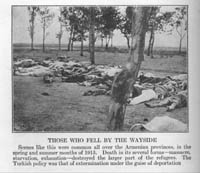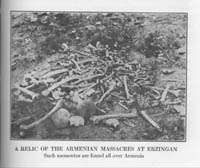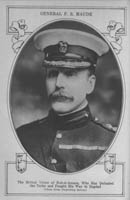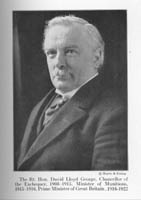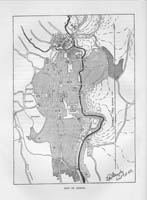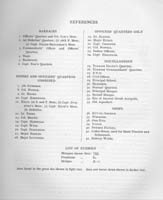Table of Contents
Chapter 15
The American YMCA and Allied Prisoner Relief in the Ottoman Empire
1
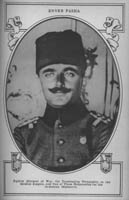 When war broke out in Europe in July 1914, the Ottoman Empire announced its neutrality. Enver Pasha, the Minister of War, proposed
a secret alliance with the Germans against the Russians, which the two powers signed in August. Although Turkey was to enter the
war when Russia attacked either Germany or Austria-Hungary, the Ottomans remained neutral for several months to gain time to complete
their mobilization preparations. During this period, the British government made several attempts to assure the continued neutrality
of Turkey, and the Russian regime sought to enter into an alliance with the Turks. The Ottomans, however, were firmly entrenched in
the Central Power camp, and in August, the Turks provided safe haven for two German warships, the SMS Goeben and SMS
Breslau, fleeing a British naval squadron.
When war broke out in Europe in July 1914, the Ottoman Empire announced its neutrality. Enver Pasha, the Minister of War, proposed
a secret alliance with the Germans against the Russians, which the two powers signed in August. Although Turkey was to enter the
war when Russia attacked either Germany or Austria-Hungary, the Ottomans remained neutral for several months to gain time to complete
their mobilization preparations. During this period, the British government made several attempts to assure the continued neutrality
of Turkey, and the Russian regime sought to enter into an alliance with the Turks. The Ottomans, however, were firmly entrenched in
the Central Power camp, and in August, the Turks provided safe haven for two German warships, the SMS Goeben and SMS
Breslau, fleeing a British naval squadron.
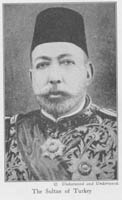 The Turkish government "purchased" these warships from the Germans to replace two battleships that were under construction in
Britain and had been commandeered by the English government. The German crews simply changed uniforms and manned the Turkish warships
in a military operation against southern Russian ports on the Black Sea. In late October, the Turks bombarded Odessa, Sebastopol,
and Theodosia, in response to which Russia declared war against the Ottoman Empire on 2 November 1914. The British also moved
against the Ottomans, annexing Cyprus in November and proclaiming a protectorate over Egypt in December. As Caliph and leader of
the Muslim world, Sultan Mohammed V declared a jihad (holy war) on November 14 against all nations fighting Turkey or its
allies. The World War now encompassed most of the Near East.1
The Turkish government "purchased" these warships from the Germans to replace two battleships that were under construction in
Britain and had been commandeered by the English government. The German crews simply changed uniforms and manned the Turkish warships
in a military operation against southern Russian ports on the Black Sea. In late October, the Turks bombarded Odessa, Sebastopol,
and Theodosia, in response to which Russia declared war against the Ottoman Empire on 2 November 1914. The British also moved
against the Ottomans, annexing Cyprus in November and proclaiming a protectorate over Egypt in December. As Caliph and leader of
the Muslim world, Sultan Mohammed V declared a jihad (holy war) on November 14 against all nations fighting Turkey or its
allies. The World War now encompassed most of the Near East.1
2
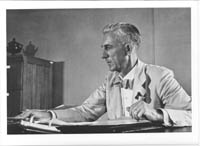 In September 1914, Darius A. Davis reported to the International Committee that Turkish preparations for the war had begun to strain
Association operations. The government had mobilized the army, provisioned the fleet, suppressed the Capitulations, and closed the
Dardanelles. The YMCA in Turkey felt the effects of these actions, since many members had either enlisted in the army or fled the
country, and the loss of membership resulted in a financial drain on the organization. The Constantinople Association lost three members
of its Board of Managers due to the war, but the American secretaries continued their relief work.2
In September 1914, Darius A. Davis reported to the International Committee that Turkish preparations for the war had begun to strain
Association operations. The government had mobilized the army, provisioned the fleet, suppressed the Capitulations, and closed the
Dardanelles. The YMCA in Turkey felt the effects of these actions, since many members had either enlisted in the army or fled the
country, and the loss of membership resulted in a financial drain on the organization. The Constantinople Association lost three members
of its Board of Managers due to the war, but the American secretaries continued their relief work.2
3
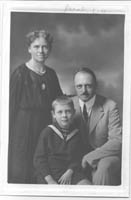 In Constantinople, Ernst O. Jacob and Dirk Johannes Van Bommel kept the Association running in temporary quarters while the
permanent building underwent renovations. This was difficult, since the Constantinople Association had lost over two hundred members due
to the mobilizations of the Turkish and Greek armies. Van Bommel added several more evening classes including Italian, bookkeeping,
and music. The members joined the Mandolin and Guitar Club and formed a Sporting Club to pursue outdoor sports. He also expanded
social work to counter vices, offering classes and discussion groups on subjects such as dishonesty. Jacob focused on writing,
editing, and managing the Association Quarterly, which took a great deal of his time. The highlight of the first year of the war
was the opening of the new Constantinople Association building in September 1915. The official inauguration was celebrated on
October 15, as U.S. Ambassador Henry Morgenthau delivered the congratulatory address to an assembly of five hundred guests. The YMCA was
one of the few organizations, outside of the government, that was able to secure construction crews and material during wartime
to finish the remodeling. The facility did lack a gymnasium, but the Association planned to rectify that deficiency as soon as
the war was over.3
In Constantinople, Ernst O. Jacob and Dirk Johannes Van Bommel kept the Association running in temporary quarters while the
permanent building underwent renovations. This was difficult, since the Constantinople Association had lost over two hundred members due
to the mobilizations of the Turkish and Greek armies. Van Bommel added several more evening classes including Italian, bookkeeping,
and music. The members joined the Mandolin and Guitar Club and formed a Sporting Club to pursue outdoor sports. He also expanded
social work to counter vices, offering classes and discussion groups on subjects such as dishonesty. Jacob focused on writing,
editing, and managing the Association Quarterly, which took a great deal of his time. The highlight of the first year of the war
was the opening of the new Constantinople Association building in September 1915. The official inauguration was celebrated on
October 15, as U.S. Ambassador Henry Morgenthau delivered the congratulatory address to an assembly of five hundred guests. The YMCA was
one of the few organizations, outside of the government, that was able to secure construction crews and material during wartime
to finish the remodeling. The facility did lack a gymnasium, but the Association planned to rectify that deficiency as soon as
the war was over.3
4
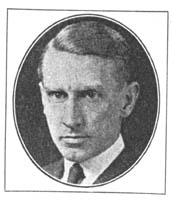 Student work also continued at full force throughout the Near East. Jacob reported that YMCA programs had expanded at several
points during 1915. Sunday schools and a boys' club began operations at Anatolia College. During a revival at St. Paul's College
in Tarsus, two-thirds of the student body decided to join the Student Association. A five-day Association conference was held at
the International College in Smyrna in July to discuss political and educational opportunities in the Near East after the war.
Most importantly, the students at the International College managed to maintain high moral standards, with the help of prayer
and evangelistic meetings led by the secretary, after an Allied naval bombardment forced the girl's school to close and integrate
with the men's college. Jacob believed that the Lebanon Conference had firmly established the Student Volunteer Movement as a
major moral force in the Ottoman Empire. At Robert College in Constantinople, Owen Pence increased the number of Bible classes
from two to eight, although the academic year was cut short when many of the students were drafted. In May 1915, Pence conducted
a YMCA conference that reviewed the Student Association's activities and planned for the next academic year. When the college
reopened in September, Pence reported that a new spirit permeated the college, and that students were free to develop new Association
methods and ideas. The Student Association was divided into a number of committees (meeting, poster, campus service, and benevolent)
to promote social welfare programs. Pence did note that operations were hindered by the fear of Protestant propaganda, and that
this suspicion spread insidiously across the campus.4 To maintain friendly
relations with the Ottomans, the American secretaries offered to provide relief work for Turkish soldiers, but they found it
very difficult to set up relief operations. The Ottoman government made every effort to give the Turkish Army a strong consciousness
of its Muslim character and mission, and military officials rejected any effort that would weaken this message. In January 1915,
the YMCA made small inroads regarding War Work when the secretaries decided to open the Association building on Fridays to troops
at the School of Reserve Officers. They conducted a Bible class for men who decided to participate, although their numbers remained
small.5
Student work also continued at full force throughout the Near East. Jacob reported that YMCA programs had expanded at several
points during 1915. Sunday schools and a boys' club began operations at Anatolia College. During a revival at St. Paul's College
in Tarsus, two-thirds of the student body decided to join the Student Association. A five-day Association conference was held at
the International College in Smyrna in July to discuss political and educational opportunities in the Near East after the war.
Most importantly, the students at the International College managed to maintain high moral standards, with the help of prayer
and evangelistic meetings led by the secretary, after an Allied naval bombardment forced the girl's school to close and integrate
with the men's college. Jacob believed that the Lebanon Conference had firmly established the Student Volunteer Movement as a
major moral force in the Ottoman Empire. At Robert College in Constantinople, Owen Pence increased the number of Bible classes
from two to eight, although the academic year was cut short when many of the students were drafted. In May 1915, Pence conducted
a YMCA conference that reviewed the Student Association's activities and planned for the next academic year. When the college
reopened in September, Pence reported that a new spirit permeated the college, and that students were free to develop new Association
methods and ideas. The Student Association was divided into a number of committees (meeting, poster, campus service, and benevolent)
to promote social welfare programs. Pence did note that operations were hindered by the fear of Protestant propaganda, and that
this suspicion spread insidiously across the campus.4 To maintain friendly
relations with the Ottomans, the American secretaries offered to provide relief work for Turkish soldiers, but they found it
very difficult to set up relief operations. The Ottoman government made every effort to give the Turkish Army a strong consciousness
of its Muslim character and mission, and military officials rejected any effort that would weaken this message. In January 1915,
the YMCA made small inroads regarding War Work when the secretaries decided to open the Association building on Fridays to troops
at the School of Reserve Officers. They conducted a Bible class for men who decided to participate, although their numbers remained
small.5
5 Association relief operations expanded as the war continued. In June 1915, Jacob began relief work at the Tash Kishle Barracks in Constantinople, the same facility Davis had worked at during the Balkan Wars. The Turks placed Jacob in charge of repairing and cleaning the 440-bed hospital for wounded and sick troops. Over a ten-day period, he supervised a crew of fifty men that included whitewashers, painters, and carpenters. The secretary hired twelve cleaning women to maintain sanitary conditions. Once the work was completed, Jacob accepted responsibility for keeping the American Red Cross section of the hospital clean, organized, and in good repair. While Jacob wanted greater responsibilities, two members of the Board of Managers, Dr. William W. Peet and Dr. M. Bowen, assured him that with his technical training and knowledge of Turkish, he could provide a service that would not be possible for most Americans. Hospital officials replaced Jacob in September 1915 with a Turkish superintendent, but the American secretary returned to work in January 1916 because the Turkish official had broken down under the heavy strain. Pence conducted similar work in another Turkish military hospital beginning in May 1915. He helped dress bandages for the wounded in the morning and organized Greek, Armenian, and Bulgarian students in rolling bandages. At the Association building, Jacob organized English Bible classes for Christian soldiers in the Turkish Army.6
6
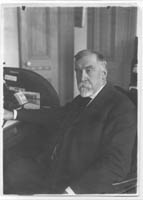 Despite these services for the Turkish Army, the opportunities for the Association to conduct relief work gradually deteriorated.
In his annual report in September 1916, Jacob declared that "Turkey was miserable and work disheartening over the past year." In
January 1915, forty Associations thrived across the Ottoman Empire, but within a year only five remained in operation. The national
Association's work had ground almost to a halt by the beginning of 1916. Student Association work continued at Robert College and the
International College, but at a greatly reduced level. Pence found that Turkish suspicion of foreigners and Protestant propaganda
undermined his work at Robert College. By August 1916, he closed down operations at the school and eventually departed Constantinople
for assignment in France. The Pera Association no longer held meetings, socials, or athletic competitions, since military service
had taken away most of the members. The Greek Bible classes were canceled, leaving only the English Bible and moral/social problem
classes.
Despite these services for the Turkish Army, the opportunities for the Association to conduct relief work gradually deteriorated.
In his annual report in September 1916, Jacob declared that "Turkey was miserable and work disheartening over the past year." In
January 1915, forty Associations thrived across the Ottoman Empire, but within a year only five remained in operation. The national
Association's work had ground almost to a halt by the beginning of 1916. Student Association work continued at Robert College and the
International College, but at a greatly reduced level. Pence found that Turkish suspicion of foreigners and Protestant propaganda
undermined his work at Robert College. By August 1916, he closed down operations at the school and eventually departed Constantinople
for assignment in France. The Pera Association no longer held meetings, socials, or athletic competitions, since military service
had taken away most of the members. The Greek Bible classes were canceled, leaving only the English Bible and moral/social problem
classes.
7 Even the Association Quarterly suspended publication in January, leaving Jacob with little to do. While the Orthodox ecclesiastics continued to support the YMCA in Constantinople, the Association worried about their Armenian supporters. By early 1916, it was clear that the Ottoman government was conducting a wholesale purge of its Christian nationals, with official efforts focusing on the Armenians. Jacob reported that the Turkish government believed that the:
…Christian races must be reduced to a state where they would be forever negligible in the development of a Turkey for Turks. They planned to completely annihilate the national life and institutions of the Armenian race… The Turkish program was fiendishly successful-hundreds of thousands of Armenians had died and many more would perish. The hopes of the Armenians were utterly crushed… As a race and as individuals they feel themselves doomed as long as the Turk is their lord.7
The YMCA had lost at least thirty Associations among the Armenians due to their forced deportation. Jacob heard that the Turks planned similar operations against the Syrian Christians, and he also feared for the Greek Orthodox Christians in the Ottoman Empire if Greece joined the Allies in the war. It was becoming impossible for the American YMCA secretaries to continue their welfare program in Turkey.8
8
The staff of the U.S. embassy supported the American secretaries. Jacob praised Ambassador Henry Morgenthau, Consul-General
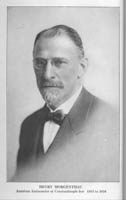 G. Bie Ravndal, and the other members of the staff for firmly backing the YMCA in its dealings with the Ottoman government
(Ravndal was a member of the Association's Board of Managers). As relations with the Turkish government deteriorated, Morgenthau
advised the American YMCA in November 1915 to discontinue most activities in Constantinople. The city's chief of police proposed
that the government requisition the Association building to serve as the new police headquarters, but Morgenthau intervened and
prevented the police from seizing the facility.
The U.S. ambassador warned that the Turks would undoubtedly renew their attempts to seize YMCA property, and recommended that
the Association dissolve its Board of Managers and form a new directorship; the secretaries and board members agreed to this
proposal in December. A new board of directors, consisting of five Americans and three Germans (including Bowen, Peet, Ravndal,
and G. H. Huntington), replaced the old Board of Managers. When Morgenthau left Constantinople in 1916, he was replaced as
ambassador by Abram I. Elkus, who supported the American YMCA with as much enthusiasm as his predecessor. When the Turkish
government imposed a "club tax" of 15 percent of the rental value of the building on the YMCA (a tax assessed on clubs, casinos,
and beer halls), the Association paid, although Elkus attempted to intervene on the Red Triangle's behalf. He recommended that
the Board of Directors not resume their activities due to government opposition.9
G. Bie Ravndal, and the other members of the staff for firmly backing the YMCA in its dealings with the Ottoman government
(Ravndal was a member of the Association's Board of Managers). As relations with the Turkish government deteriorated, Morgenthau
advised the American YMCA in November 1915 to discontinue most activities in Constantinople. The city's chief of police proposed
that the government requisition the Association building to serve as the new police headquarters, but Morgenthau intervened and
prevented the police from seizing the facility.
The U.S. ambassador warned that the Turks would undoubtedly renew their attempts to seize YMCA property, and recommended that
the Association dissolve its Board of Managers and form a new directorship; the secretaries and board members agreed to this
proposal in December. A new board of directors, consisting of five Americans and three Germans (including Bowen, Peet, Ravndal,
and G. H. Huntington), replaced the old Board of Managers. When Morgenthau left Constantinople in 1916, he was replaced as
ambassador by Abram I. Elkus, who supported the American YMCA with as much enthusiasm as his predecessor. When the Turkish
government imposed a "club tax" of 15 percent of the rental value of the building on the YMCA (a tax assessed on clubs, casinos,
and beer halls), the Association paid, although Elkus attempted to intervene on the Red Triangle's behalf. He recommended that
the Board of Directors not resume their activities due to government opposition.9
9
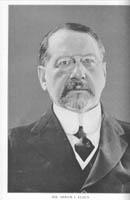 Since Association work was effectively closed down as a result of the dissolution of the Board of Managers, tensions with the Turkish
government, and wartime mobilization, the YMCA had to decide what to do with the Constantinople property. At the final Board of
Managers meeting in December 1915, Ravndal had suggested that the YMCA suspend its operations and rent the building to the American
embassy, but the board members did not reach a decision. The new Board of Directors held a meeting in June 1916 to plan a course
of action. Jacob had already discussed renting the facility to the Danish embassy with Ambassador Morgenthau. Jacob thought the
building was large enough to rent to both the American and Danish embassies. The directorship voted to rent the property to either
the Danes or the ministry of some other neutral power. The International Committee also entered the equation at this point. The
American YMCA agreed to provide subsidies to maintain the building in Constantinople, but since the building was in minimal use,
these funds could be better spent on other wartime projects. The International Committee preferred that the Constantinople
Association lease the property for the cost of the maintenance of the building, with the proviso that the building be returned
ready for normal use at the end of the war. John R. Mott had a conference with Ambassador Elkus in August 1916 to discuss the
future of the property.10
Since Association work was effectively closed down as a result of the dissolution of the Board of Managers, tensions with the Turkish
government, and wartime mobilization, the YMCA had to decide what to do with the Constantinople property. At the final Board of
Managers meeting in December 1915, Ravndal had suggested that the YMCA suspend its operations and rent the building to the American
embassy, but the board members did not reach a decision. The new Board of Directors held a meeting in June 1916 to plan a course
of action. Jacob had already discussed renting the facility to the Danish embassy with Ambassador Morgenthau. Jacob thought the
building was large enough to rent to both the American and Danish embassies. The directorship voted to rent the property to either
the Danes or the ministry of some other neutral power. The International Committee also entered the equation at this point. The
American YMCA agreed to provide subsidies to maintain the building in Constantinople, but since the building was in minimal use,
these funds could be better spent on other wartime projects. The International Committee preferred that the Constantinople
Association lease the property for the cost of the maintenance of the building, with the proviso that the building be returned
ready for normal use at the end of the war. John R. Mott had a conference with Ambassador Elkus in August 1916 to discuss the
future of the property.10
10
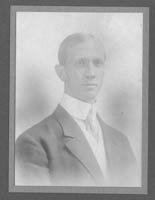 In September 1916, the board met again but voted not to lease the building. But the International Committee intervened and
persuaded the directors to change their minds. Ravndal pointed out to the directorship that the American embassy needed additional
room to carry out POW work and other relief operations in the Ottoman Empire. When Turkey entered the war, the U.S. embassy
became responsible for protecting the interests in the Ottoman Empire of Britain, France, and Russia, plus four other belligerents.
As a result, the U.S. staff was pressed for space in the embassy and was searching for an annex, and Ravndal argued that the
Association building would be put to good use housing the relief operations of the embassy staff. As a result, the Board of
Directors voted to lease the building to the U.S. embassy for $4,200 per year. Van Bommel and his family would occupy the top
floor of the facility as caretakers and assist the embassy staff in its relief work. American officials took over the building
(which was directly adjacent to the U.S. embassy) on November 28. Because of the cutback in YMCA operations, Jacob decided in
June 1916 to return to the United States in preparation for POW work in Germany. Because of his knowledge of German and his
Association experience, the International Committee accepted his transfer to Conrad Hoffman's staff. This left Van
Bommel the last representative of the American YMCA in the Ottoman Empire.11
In September 1916, the board met again but voted not to lease the building. But the International Committee intervened and
persuaded the directors to change their minds. Ravndal pointed out to the directorship that the American embassy needed additional
room to carry out POW work and other relief operations in the Ottoman Empire. When Turkey entered the war, the U.S. embassy
became responsible for protecting the interests in the Ottoman Empire of Britain, France, and Russia, plus four other belligerents.
As a result, the U.S. staff was pressed for space in the embassy and was searching for an annex, and Ravndal argued that the
Association building would be put to good use housing the relief operations of the embassy staff. As a result, the Board of
Directors voted to lease the building to the U.S. embassy for $4,200 per year. Van Bommel and his family would occupy the top
floor of the facility as caretakers and assist the embassy staff in its relief work. American officials took over the building
(which was directly adjacent to the U.S. embassy) on November 28. Because of the cutback in YMCA operations, Jacob decided in
June 1916 to return to the United States in preparation for POW work in Germany. Because of his knowledge of German and his
Association experience, the International Committee accepted his transfer to Conrad Hoffman's staff. This left Van
Bommel the last representative of the American YMCA in the Ottoman Empire.11
The Y.M.C.A. and POW Relief in the Turkish Empire during World War I
11
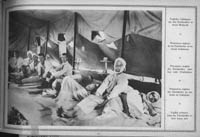 While the lot of the Turkish soldier was very difficult in the Ottoman Army, the situation for prisoners-of-war was far worse.
The Turks did not have many opportunities to seize prisoners for the first two years of the war because their military operations
While the lot of the Turkish soldier was very difficult in the Ottoman Army, the situation for prisoners-of-war was far worse.
The Turks did not have many opportunities to seize prisoners for the first two years of the war because their military operations
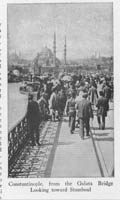 were limited to a weak strike against the Suez Canal in February 1915 and defensive
operations in Gallipoli from April 1915 to
January 1916. While fighting for control of the Straits was intense (the Allies sent approximately five hundred thousand men into the campaign,
and over half became battle casualties; Turkish losses were equally high), the Allies never broke out of their beachheads, and
the Turks allowed the Allied forces to evacuate without attacking. As a result, the Turks captured relatively few prisoners. The
Ottomans would not achieve a major military success until April of 1916, at Kut-al-Amara.
were limited to a weak strike against the Suez Canal in February 1915 and defensive
operations in Gallipoli from April 1915 to
January 1916. While fighting for control of the Straits was intense (the Allies sent approximately five hundred thousand men into the campaign,
and over half became battle casualties; Turkish losses were equally high), the Allies never broke out of their beachheads, and
the Turks allowed the Allied forces to evacuate without attacking. As a result, the Turks captured relatively few prisoners. The
Ottomans would not achieve a major military success until April of 1916, at Kut-al-Amara.
12
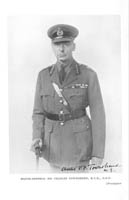 The British landed forces at Basra at the head of the Persian Gulf in November 1914 in preparation for an assault along the Tigris
and Euphrates Rivers against Baghdad. In June 1915, General Charles Townshend led an expeditionary force of British and Indian
troops from Kuwait for the advance through Mesopotamia. The Anglo-Indian force made phenomenal progress until the Turks stopped
the Allied advance at the bloody battle of Ctesiphon, fifteen miles southeast of Baghdad, in November 1915.
Townshend withdrew to the fortress garrison at Kut-al-Amara on the Tigris River so
The British landed forces at Basra at the head of the Persian Gulf in November 1914 in preparation for an assault along the Tigris
and Euphrates Rivers against Baghdad. In June 1915, General Charles Townshend led an expeditionary force of British and Indian
troops from Kuwait for the advance through Mesopotamia. The Anglo-Indian force made phenomenal progress until the Turks stopped
the Allied advance at the bloody battle of Ctesiphon, fifteen miles southeast of Baghdad, in November 1915.
Townshend withdrew to the fortress garrison at Kut-al-Amara on the Tigris River so
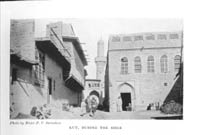 that his disease- and heat-ridden troops could
recuperate. Over ten thousand British and Indian troops, 3,500 Indian non-combatants, and three thousand sick and wounded arrived in Kut. The
Turks rushed forces to Kut and encircled the garrison. The siege began on December 4, and the Allied garrison held out, fighting
against malaria and starvation, waiting for the arrival of a British relief column. The siege lasted 147 days before Townshend
surrendered on 29 April 1916.12
that his disease- and heat-ridden troops could
recuperate. Over ten thousand British and Indian troops, 3,500 Indian non-combatants, and three thousand sick and wounded arrived in Kut. The
Turks rushed forces to Kut and encircled the garrison. The siege began on December 4, and the Allied garrison held out, fighting
against malaria and starvation, waiting for the arrival of a British relief column. The siege lasted 147 days before Townshend
surrendered on 29 April 1916.12
13
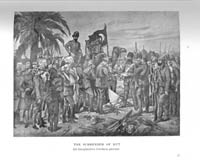 On 6 May 1916, the Turks began a 1,200-mile forced march of the British prisoners across the Syrian Desert from Kut. Mounted
Arab and Kurdish guards prodded over 2,500 British soldiers with rifle butts and whips on the long death march. Starvation,
thirst, disease, and exhaustion thinned out the British column, and only 837 soldiers survived the march. Turkish treatment of the
On 6 May 1916, the Turks began a 1,200-mile forced march of the British prisoners across the Syrian Desert from Kut. Mounted
Arab and Kurdish guards prodded over 2,500 British soldiers with rifle butts and whips on the long death march. Starvation,
thirst, disease, and exhaustion thinned out the British column, and only 837 soldiers survived the march. Turkish treatment of the
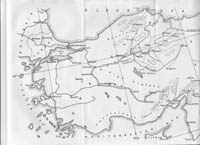 Indian troops was better, as the Ottomans attempted to attract fellow Muslims to their cause. During the siege, the Turks attempted
to inspire mutiny among the Indian forces in Kut by leaving bundles of propaganda pamphlets along the barbed-wire front lines
calling on the Indians to murder their British officers and join the Sultan's forces. While the British attempted to intercept
Indian troops was better, as the Ottomans attempted to attract fellow Muslims to their cause. During the siege, the Turks attempted
to inspire mutiny among the Indian forces in Kut by leaving bundles of propaganda pamphlets along the barbed-wire front lines
calling on the Indians to murder their British officers and join the Sultan's forces. While the British attempted to intercept
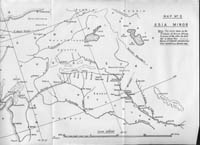 these pamphlets, some did get through and led to a number of desertions.
But when the garrison fell, 9,300 Indian troops and non-combatants joined the death march. For the Turks, the success at Kut was a
tremendous moral victory. They had demonstrated that the all-powerful and all-conquering British Raj was a myth. While the British
these pamphlets, some did get through and led to a number of desertions.
But when the garrison fell, 9,300 Indian troops and non-combatants joined the death march. For the Turks, the success at Kut was a
tremendous moral victory. They had demonstrated that the all-powerful and all-conquering British Raj was a myth. While the British
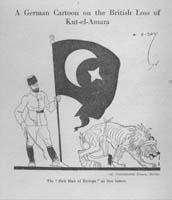 government offered the Turks £ 2 million in gold in exchange for the repatriation of the garrison, the Ottomans turned down the
offer. Instead, they used the POWs as propaganda tools. The Turks paraded the British prisoners through the streets of Baghdad
and other towns in the empire, where the Ottoman subjects could revile, stone, and spit on the hated English. This public taunting
of the proud British imperialists carried an important message: the British could be humbled, degraded, and enslaved. The defeat
at Kut marked an important step towards the collapse of the British Empire.13
government offered the Turks £ 2 million in gold in exchange for the repatriation of the garrison, the Ottomans turned down the
offer. Instead, they used the POWs as propaganda tools. The Turks paraded the British prisoners through the streets of Baghdad
and other towns in the empire, where the Ottoman subjects could revile, stone, and spit on the hated English. This public taunting
of the proud British imperialists carried an important message: the British could be humbled, degraded, and enslaved. The defeat
at Kut marked an important step towards the collapse of the British Empire.13
14
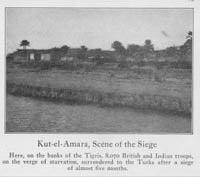 In general, the Turks did not follow Western rules and regulations in dealing with war prisoners. The Western press described in
detail the atrocities faced by Allied (especially British) POWs. Captured soldiers were herded like sheep by mounted Arab troopers,
who freely used sticks and whips to keep stragglers marching. Food was very scarce, and the POWs rarely had access to fresh water.
The desert climate where most of the campaigning took place had a debilitating impact on prisoners, especially the heat and dust.
Often Turkish troops and guards relieved captives of their water bottles, boots, and uniforms, leaving the POWs in an assortment of
rags-Ottoman officers exercised very little control over their men.
When prisoners collapsed exhausted, starved, or ill, many were left to fend for themselves in hovels. These mud-walled "shelters"
were often filled with vermin, and soldiers had to resort to begging from passing Arabs for scraps of food. Many of these invalids
were robbed, stripped of their last clothing, and left to die. After marching across the desert, the remaining POWs entered prison
camps where they received insufficient food and faced epidemics of dysentery, cholera, and malaria. Many prisoners were simply
incarcerated in regular jails with common criminals, without regard for rank or status. Prisoners sat in bare cells filled with
vermin, few washing facilities, and no physical exercise. The POW under Turkish care faced a cruel existence.14
In general, the Turks did not follow Western rules and regulations in dealing with war prisoners. The Western press described in
detail the atrocities faced by Allied (especially British) POWs. Captured soldiers were herded like sheep by mounted Arab troopers,
who freely used sticks and whips to keep stragglers marching. Food was very scarce, and the POWs rarely had access to fresh water.
The desert climate where most of the campaigning took place had a debilitating impact on prisoners, especially the heat and dust.
Often Turkish troops and guards relieved captives of their water bottles, boots, and uniforms, leaving the POWs in an assortment of
rags-Ottoman officers exercised very little control over their men.
When prisoners collapsed exhausted, starved, or ill, many were left to fend for themselves in hovels. These mud-walled "shelters"
were often filled with vermin, and soldiers had to resort to begging from passing Arabs for scraps of food. Many of these invalids
were robbed, stripped of their last clothing, and left to die. After marching across the desert, the remaining POWs entered prison
camps where they received insufficient food and faced epidemics of dysentery, cholera, and malaria. Many prisoners were simply
incarcerated in regular jails with common criminals, without regard for rank or status. Prisoners sat in bare cells filled with
vermin, few washing facilities, and no physical exercise. The POW under Turkish care faced a cruel existence.14
15
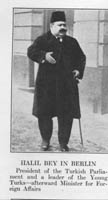 The plight of Allied POWs in Turkish hands concerned the American secretaries in Constantinople. In December 1915, Mott instructed
Jacob to approach Turkish officials about the American YMCA setting up a War Prisoners' Aid (WPA) program in the Ottoman Empire.
Jacob immediately took up the subject with Bowen, Peet, and Van Bommel. Although all of the Association officials were pessimistic
about being granted access to Turkish POWs, they agreed that their best strategy was negotiation through the U.S. embassy. Ambassador
Morgenthau was very interested in the proposal, but he was overwhelmed with preparations for his departure. He turned the matter over
to Mr. Philip, the embassy's Charge d'Affaires. As the American official responsible for the care of Allied POWs in the Ottoman Empire
since the beginning of the war, Philip embraced the YMCA's offer. He endorsed the WPA plan without qualification and was optimistic
about its implementation. Philip took up the proposal with Halil Bey, the Minister of Foreign Affairs, and presented his case to the
ministry staff. In the meantime, Jacob attempted to get other influential Turks interested in the plan. Through Graf Luttichau, a
member of the Constantinople Association's Board of Managers, Jacob received an introduction at the German embassy. After an interview,
the German ambassador promised to speak in favor of the YMCA proposal with Halil Bey. When Philip met with Halil Bey several days
later, the Turkish minister reported that the German ambassador had explained the details of the WPA plan and that the German
government was grateful for what the American YMCA had done for German POWs in Britain and France. The German government supported
the implementation of a WPA program for Allied POWs in Turkey. The Foreign Minister stated that the Association proposal had made
a strong and favorable impression on the Turkish government.15
The plight of Allied POWs in Turkish hands concerned the American secretaries in Constantinople. In December 1915, Mott instructed
Jacob to approach Turkish officials about the American YMCA setting up a War Prisoners' Aid (WPA) program in the Ottoman Empire.
Jacob immediately took up the subject with Bowen, Peet, and Van Bommel. Although all of the Association officials were pessimistic
about being granted access to Turkish POWs, they agreed that their best strategy was negotiation through the U.S. embassy. Ambassador
Morgenthau was very interested in the proposal, but he was overwhelmed with preparations for his departure. He turned the matter over
to Mr. Philip, the embassy's Charge d'Affaires. As the American official responsible for the care of Allied POWs in the Ottoman Empire
since the beginning of the war, Philip embraced the YMCA's offer. He endorsed the WPA plan without qualification and was optimistic
about its implementation. Philip took up the proposal with Halil Bey, the Minister of Foreign Affairs, and presented his case to the
ministry staff. In the meantime, Jacob attempted to get other influential Turks interested in the plan. Through Graf Luttichau, a
member of the Constantinople Association's Board of Managers, Jacob received an introduction at the German embassy. After an interview,
the German ambassador promised to speak in favor of the YMCA proposal with Halil Bey. When Philip met with Halil Bey several days
later, the Turkish minister reported that the German ambassador had explained the details of the WPA plan and that the German
government was grateful for what the American YMCA had done for German POWs in Britain and France. The German government supported
the implementation of a WPA program for Allied POWs in Turkey. The Foreign Minister stated that the Association proposal had made
a strong and favorable impression on the Turkish government.15
16
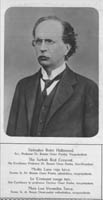 When the YMCA proposal was referred to Enver Pasha, the Minister of War, the final decision was delayed by his trips into
the interior. This gave Jacob time to get other influential people interested in the WPA plan. He approached men known to
hold the ear of the Minister of War, including Dr. Bessim Omer Pasha, the Vice President of the Turkish Red Crescent Society,
the channel through which foreign assistance was conveyed to Allied POWs. Jacob found the Red Crescent official reasonable and
amenable to the Association's proposal. After hearing the plan, he assured Jacob that he would urge its acceptance by both
the Minister of War and the Minister of Foreign Affairs. Jacob also approached Captain Humann, the German naval attaché
and a personal friend of Enver Pasha. This lead was not pursued, however, after the U.S. embassy received word from the Ministry
of War that the WPA plan had been categorically refused.16
When the YMCA proposal was referred to Enver Pasha, the Minister of War, the final decision was delayed by his trips into
the interior. This gave Jacob time to get other influential people interested in the WPA plan. He approached men known to
hold the ear of the Minister of War, including Dr. Bessim Omer Pasha, the Vice President of the Turkish Red Crescent Society,
the channel through which foreign assistance was conveyed to Allied POWs. Jacob found the Red Crescent official reasonable and
amenable to the Association's proposal. After hearing the plan, he assured Jacob that he would urge its acceptance by both
the Minister of War and the Minister of Foreign Affairs. Jacob also approached Captain Humann, the German naval attaché
and a personal friend of Enver Pasha. This lead was not pursued, however, after the U.S. embassy received word from the Ministry
of War that the WPA plan had been categorically refused.16
17
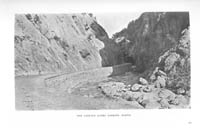 Although the Turkish government rejected the WPA plan, the Association secretaries were not ready to give up the project. Philip
promised to reopen negotiations personally with Enver Pasha, but, due to suspicion within the Ottoman government regarding
foreigners, it would take time. The Turks were even mistrustful of foreign representatives visiting prison camps. Philip had
repeatedly requested that the government send American representatives to the major prison compounds, but the Ottomans had
Although the Turkish government rejected the WPA plan, the Association secretaries were not ready to give up the project. Philip
promised to reopen negotiations personally with Enver Pasha, but, due to suspicion within the Ottoman government regarding
foreigners, it would take time. The Turks were even mistrustful of foreign representatives visiting prison camps. Philip had
repeatedly requested that the government send American representatives to the major prison compounds, but the Ottomans had
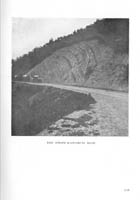 categorically denied them entry. One factor that might change Turkish POW policy was their recent victory in Mesopotamia.
Before April 1916, the Ottomans held very few Allied POWs, until the Turks won their victory at Kut-el-Amara. While a number
of these POWs remained in Baghdad for three months, the U.S. Consul, Mr. Brissell, worked to improve the prisoners' meager
rations. In August, the survivors marched to Asia Minor for final internment, either in prison camps or in labor detachments
(the Turks assigned many of the POWs to work on the Anatolia segment of the Berlin-to-Baghdad railroad). In November 1918, an official British report declared
that 3,290 British and Indian POWs from Kut-el-Amara had died in Turkish captivity, and an additional 2,222 were missing and
presumed dead.17
categorically denied them entry. One factor that might change Turkish POW policy was their recent victory in Mesopotamia.
Before April 1916, the Ottomans held very few Allied POWs, until the Turks won their victory at Kut-el-Amara. While a number
of these POWs remained in Baghdad for three months, the U.S. Consul, Mr. Brissell, worked to improve the prisoners' meager
rations. In August, the survivors marched to Asia Minor for final internment, either in prison camps or in labor detachments
(the Turks assigned many of the POWs to work on the Anatolia segment of the Berlin-to-Baghdad railroad). In November 1918, an official British report declared
that 3,290 British and Indian POWs from Kut-el-Amara had died in Turkish captivity, and an additional 2,222 were missing and
presumed dead.17
18
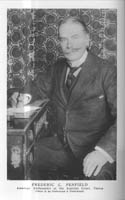 While the American secretaries had encountered a dead end in Constantinople, a new opportunity arose through the Austrian
Red Cross. Baron Markus von Spiegelfeld, a member of the War Prisoners' Aid committee in Austria-Hungary and an official in the
Austrian Red Cross, wrote to the President of the Turkish Red Crescent Society. Von Spiegelfeld introduced Christian Phildius,
General Secretary of the World's Alliance, who was traveling to Constantinople to organize World Committee activities in the
Ottoman Empire. He outlined WPA activities underway in the Dual Monarchy, and described the significant benefit they created
for Allied POWs in Austria-Hungary.
He pointed out that the American YMCA had already established extensive POW relief programs that were of great benefit to
Turkish prisoners in Russia. Von Spiegelfeld hoped that the Ottomans would take advantage of this philanthropic opportunity
to provide relief for Allied POWs in Turkey. This introduction gave the World's Alliance a foot in the door of the Ottoman
Empire. In addition, Frederic Penfield, U.S. Ambassador to Austria-Hungary, wrote an official letter of introduction for
Phildius to present to Ambassador Elkus in Constantinople. The Wilson Administration fully supported the Association's POW
work in Turkey. This correspondence was a very slow, but potentially promising start for YMCA WPA operations in the Near
East.18
While the American secretaries had encountered a dead end in Constantinople, a new opportunity arose through the Austrian
Red Cross. Baron Markus von Spiegelfeld, a member of the War Prisoners' Aid committee in Austria-Hungary and an official in the
Austrian Red Cross, wrote to the President of the Turkish Red Crescent Society. Von Spiegelfeld introduced Christian Phildius,
General Secretary of the World's Alliance, who was traveling to Constantinople to organize World Committee activities in the
Ottoman Empire. He outlined WPA activities underway in the Dual Monarchy, and described the significant benefit they created
for Allied POWs in Austria-Hungary.
He pointed out that the American YMCA had already established extensive POW relief programs that were of great benefit to
Turkish prisoners in Russia. Von Spiegelfeld hoped that the Ottomans would take advantage of this philanthropic opportunity
to provide relief for Allied POWs in Turkey. This introduction gave the World's Alliance a foot in the door of the Ottoman
Empire. In addition, Frederic Penfield, U.S. Ambassador to Austria-Hungary, wrote an official letter of introduction for
Phildius to present to Ambassador Elkus in Constantinople. The Wilson Administration fully supported the Association's POW
work in Turkey. This correspondence was a very slow, but potentially promising start for YMCA WPA operations in the Near
East.18
19
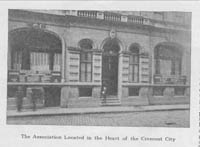 The Constantinople Association's decision to shut down operations and rent the building to the U.S. embassy also opened a back
door to YMCA POW operations in Turkey. After occupying the Association building in November 1916, the embassy staff used the
facility for POW relief work, distributing various necessities from their home governments to prisoners of war. This relief
work was now centralized in the Association building. The ground floor served as offices and a waiting room. Additional
offices, a packing room, and an inspection room were set up on the second floor. The third floor became a storeroom for
overcoats, suits, underwear, boots, towels, soap, brushes, medicine, cocoa, tea, and other articles destined for POWs. The
embassy staff labeled, packed, and shipped these goods to war prisoners scattered across Asia Minor. Van Bommel participated
in this relief work in conjunction with American embassy personnel.19
The Constantinople Association's decision to shut down operations and rent the building to the U.S. embassy also opened a back
door to YMCA POW operations in Turkey. After occupying the Association building in November 1916, the embassy staff used the
facility for POW relief work, distributing various necessities from their home governments to prisoners of war. This relief
work was now centralized in the Association building. The ground floor served as offices and a waiting room. Additional
offices, a packing room, and an inspection room were set up on the second floor. The third floor became a storeroom for
overcoats, suits, underwear, boots, towels, soap, brushes, medicine, cocoa, tea, and other articles destined for POWs. The
embassy staff labeled, packed, and shipped these goods to war prisoners scattered across Asia Minor. Van Bommel participated
in this relief work in conjunction with American embassy personnel.19
20
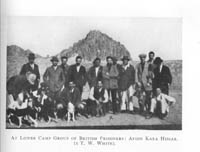 After the United States declared war on Germany in April 1917, the Wilson Administration severed diplomatic relations with the
Ottoman Empire. As a result, the Netherlands legation took over the diplomatic interests of Britain, France, Russia, and Serbia,
formerly cared for by the American government, including taking over the lease and operations of the Constantinople Association.
Van Bommel, a Dutch national, was assigned to the Netherlands Consulate. The Dutch ambassador appointed Van Bommel as an
attaché to supervise the POW relief operations. The secretary had been working for the American embassy since December
1916, while receiving his YMCA salary from the International Committee. The Dutch government asked if the American Association
could continue to pay his wages, especially since Van Bommel's work was similar to the duties performed by WPA secretaries in Europe. The
International Committee accepted this arrangement. The one drawback to Van Bommel's position was that he could not visit POWs
in the field, but would have to remain in Constantinople.20
After the United States declared war on Germany in April 1917, the Wilson Administration severed diplomatic relations with the
Ottoman Empire. As a result, the Netherlands legation took over the diplomatic interests of Britain, France, Russia, and Serbia,
formerly cared for by the American government, including taking over the lease and operations of the Constantinople Association.
Van Bommel, a Dutch national, was assigned to the Netherlands Consulate. The Dutch ambassador appointed Van Bommel as an
attaché to supervise the POW relief operations. The secretary had been working for the American embassy since December
1916, while receiving his YMCA salary from the International Committee. The Dutch government asked if the American Association
could continue to pay his wages, especially since Van Bommel's work was similar to the duties performed by WPA secretaries in Europe. The
International Committee accepted this arrangement. The one drawback to Van Bommel's position was that he could not visit POWs
in the field, but would have to remain in Constantinople.20
21
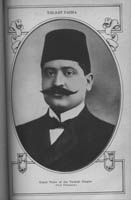 As the Dutch POW attaché, Van Bommel now worked night and day for British, French, and Russian prisoners held in
the Ottoman Empire. He was in daily touch with members of the Ottoman government, including Enver Pasha and Mehmed Talaat Pasha,
the Grand Vizier. Van Bommel supervised twenty-five workers to provide supplies for roughly fifteen thousand Allied prisoners. POW relief
work included correspondence with prisoners and their governments (regarding the location and condition of the POWs), maintaining an information bureau, and
buying and distributing supplies and money (clothing, boots, comforts, and other goods) to POWs in various camps. As attaché,
Van Bommel hoped to improve the living conditions and treatment of Allied prisoners in Turkey.21
As the Dutch POW attaché, Van Bommel now worked night and day for British, French, and Russian prisoners held in
the Ottoman Empire. He was in daily touch with members of the Ottoman government, including Enver Pasha and Mehmed Talaat Pasha,
the Grand Vizier. Van Bommel supervised twenty-five workers to provide supplies for roughly fifteen thousand Allied prisoners. POW relief
work included correspondence with prisoners and their governments (regarding the location and condition of the POWs), maintaining an information bureau, and
buying and distributing supplies and money (clothing, boots, comforts, and other goods) to POWs in various camps. As attaché,
Van Bommel hoped to improve the living conditions and treatment of Allied prisoners in Turkey.21
22
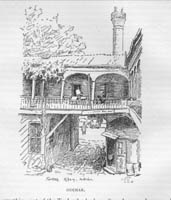 The terrible conditions facing British POWs in the Ottoman Empire became a major issue in England. The Prisoners in Turkey
Committee was formed to improve the communication with and relief distribution to British POWs under Ottoman control. Members argued that
while the Turks might be more humane than the Germans, the conditions prisoners faced were far worse. They estimated that
almost half of the British and Indian POWs held by the Turks had died by the summer of 1918, and that their living standards
had to be improved.22
The terrible conditions facing British POWs in the Ottoman Empire became a major issue in England. The Prisoners in Turkey
Committee was formed to improve the communication with and relief distribution to British POWs under Ottoman control. Members argued that
while the Turks might be more humane than the Germans, the conditions prisoners faced were far worse. They estimated that
almost half of the British and Indian POWs held by the Turks had died by the summer of 1918, and that their living standards
had to be improved.22
23
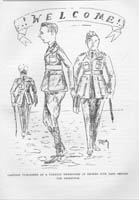 The British and Turkish governments began negotiations in Switzerland in 1917 on improving conditions for POWs. The resulting
Bern Agreement was signed in December 1917, but the Turks did not ratify the document until April 1918. This document addressed
many vital issues. The first part dealt with the repatriation of wounded POWs. Under the treaty, three hundred British and seven hundred Indian
invalid prisoners were to be immediately exchanged for 1,500 Turkish invalids. In addition, future POWs with specific disabilities
would be immediately repatriated. The repatriations were to be conducted at sea on an exchange ship that sailed from Alexandria
bound for Scala Nuova, near Smyrna, which would also carry food and clothing for Allied POWs in Turkish prisons. By September
1918, the process of repatriation had not yet begun. The British government demanded that the German and Austro-Hungarian
governments guarantee the safety of this relief ship from submarines. The English attempted to work through the Anglo-German
Conference underway at The Hague, as well as through the Spanish ambassador in Vienna, the Swedish minister in London, and the Dutch
minister in Constantinople, all without results. Even if the Central Power governments extended the guarantee, it would take
ten weeks to inform U-boats at sea of the order.23
The British and Turkish governments began negotiations in Switzerland in 1917 on improving conditions for POWs. The resulting
Bern Agreement was signed in December 1917, but the Turks did not ratify the document until April 1918. This document addressed
many vital issues. The first part dealt with the repatriation of wounded POWs. Under the treaty, three hundred British and seven hundred Indian
invalid prisoners were to be immediately exchanged for 1,500 Turkish invalids. In addition, future POWs with specific disabilities
would be immediately repatriated. The repatriations were to be conducted at sea on an exchange ship that sailed from Alexandria
bound for Scala Nuova, near Smyrna, which would also carry food and clothing for Allied POWs in Turkish prisons. By September
1918, the process of repatriation had not yet begun. The British government demanded that the German and Austro-Hungarian
governments guarantee the safety of this relief ship from submarines. The English attempted to work through the Anglo-German
Conference underway at The Hague, as well as through the Spanish ambassador in Vienna, the Swedish minister in London, and the Dutch
minister in Constantinople, all without results. Even if the Central Power governments extended the guarantee, it would take
ten weeks to inform U-boats at sea of the order.23
24
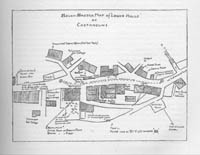 The second part of the Anglo-Turkish treaty discussed the treatment of POWs held by both powers. This section included physical
concerns such as lodging, sanitation, supplies, and physical activities, and also issues of paramount importance to the YMCA
and its WPA activities. The treaty guaranteed each nation the right to prison camp visits, and to organize and promote self-help
committees. The treaty also made accommodations for religious services and improved communication with and information about
POWs.24
The second part of the Anglo-Turkish treaty discussed the treatment of POWs held by both powers. This section included physical
concerns such as lodging, sanitation, supplies, and physical activities, and also issues of paramount importance to the YMCA
and its WPA activities. The treaty guaranteed each nation the right to prison camp visits, and to organize and promote self-help
committees. The treaty also made accommodations for religious services and improved communication with and information about
POWs.24
25
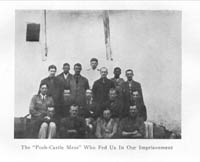 While the spiritual and mental comfort of prisoners was important, the British government emphasized the physical needs of
POWs in Turkey during 1918. A report by a member of the House of Commons in July 1918 declared that 530 British and 733 Indian
POWs had died in Turkey since 1 January 1917. The British government had proven ineffective in sending food and clothing to
their imprisoned soldiers. Limited transportation meant supplies took many months (sometimes a year) to arrive, if they survived
the journey at all. To circumvent the transportation problem, the government forwarded money to POWs to purchase their own
While the spiritual and mental comfort of prisoners was important, the British government emphasized the physical needs of
POWs in Turkey during 1918. A report by a member of the House of Commons in July 1918 declared that 530 British and 733 Indian
POWs had died in Turkey since 1 January 1917. The British government had proven ineffective in sending food and clothing to
their imprisoned soldiers. Limited transportation meant supplies took many months (sometimes a year) to arrive, if they survived
the journey at all. To circumvent the transportation problem, the government forwarded money to POWs to purchase their own
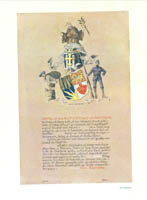 provisions, but inflation in Turkey severely depreciated paper currency and made it difficult for POWs to purchase bread, sugar,
or potatoes. Prisoners also could not afford coal during the cold winter months in the mountains of Anatolia. Because conditions
were so bad, the Prisoners in Turkey Committee recommended that all British and Indian prisoners held by the Ottomans for eighteen
months or longer be exchanged immediately. The major drawback to this plan, however, was the lack of repatriation points. While
some prisoners were exchanged between the lines in Mesopotamia in 1916, a similar exchange would have been difficult in Palestine
in 1918 due to the fluid situation on this front. Bulgaria, Austria-Hungary, and Switzerland were potential exchange points that
had yet to be explored.25
provisions, but inflation in Turkey severely depreciated paper currency and made it difficult for POWs to purchase bread, sugar,
or potatoes. Prisoners also could not afford coal during the cold winter months in the mountains of Anatolia. Because conditions
were so bad, the Prisoners in Turkey Committee recommended that all British and Indian prisoners held by the Ottomans for eighteen
months or longer be exchanged immediately. The major drawback to this plan, however, was the lack of repatriation points. While
some prisoners were exchanged between the lines in Mesopotamia in 1916, a similar exchange would have been difficult in Palestine
in 1918 due to the fluid situation on this front. Bulgaria, Austria-Hungary, and Switzerland were potential exchange points that
had yet to be explored.25
26
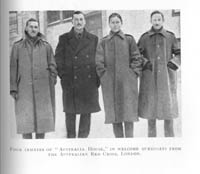 The British government had attempted to augment inadequate food and clothing supplies in two other ways. First, the English
attempted to purchase goods in Constantinople and Aleppo, with limited success. Then the British government decided to send
food and clothing parcels via Switzerland through either the American Express Company or the international postal system.
While this system succeeded in getting goods directly to British POWs, only ten pounds of food per prisoner-and no
clothing-was transported to the Ottoman Empire between February and September 1918. During that same period, English POWs
in Germany each received six hundred pounds of food and two outfits of clothing.
Despite initial objections from the War Office, which was concerned with delivery guarantees, the House of Commons voted
in August 1918 to increase food and clothing shipments to British POWs in Turkey. The War Office authorized relatives to
send one hundred pounds of food monthly, clothing, and one blanket to British officers. Care committees could send sixty
pounds of food monthly, winter clothing (including a greatcoat), and a blanket to POWs of other ranks. In addition, the
War Office agreed to send a reserve of clothing and blankets (equal to one-quarter of the quantity dispatched in individual
parcels by relatives and care committees) to the Dutch minister in Constantinople. Food supplies for four months for officers
and men, along with clothing for the ranks, would also be shipped from Alexandria.26
The British government had attempted to augment inadequate food and clothing supplies in two other ways. First, the English
attempted to purchase goods in Constantinople and Aleppo, with limited success. Then the British government decided to send
food and clothing parcels via Switzerland through either the American Express Company or the international postal system.
While this system succeeded in getting goods directly to British POWs, only ten pounds of food per prisoner-and no
clothing-was transported to the Ottoman Empire between February and September 1918. During that same period, English POWs
in Germany each received six hundred pounds of food and two outfits of clothing.
Despite initial objections from the War Office, which was concerned with delivery guarantees, the House of Commons voted
in August 1918 to increase food and clothing shipments to British POWs in Turkey. The War Office authorized relatives to
send one hundred pounds of food monthly, clothing, and one blanket to British officers. Care committees could send sixty
pounds of food monthly, winter clothing (including a greatcoat), and a blanket to POWs of other ranks. In addition, the
War Office agreed to send a reserve of clothing and blankets (equal to one-quarter of the quantity dispatched in individual
parcels by relatives and care committees) to the Dutch minister in Constantinople. Food supplies for four months for officers
and men, along with clothing for the ranks, would also be shipped from Alexandria.26
27
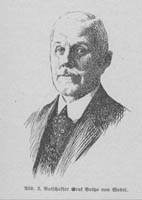 Allied pressure on the Turkish government regarding POW conditions made the Ottomans reconsider their policies. During a trip
to Germany in September 1917, Christian Phildius learned of Turkish interest in having the World's Alliance discuss the POW
situation and establish a WPA program. In January 1918, Phildius finally gained access to Turkish officials and opened the
doors of Ottoman prisons to YMCA secretaries. By the beginning of the year, Phildius had letters of recommendation from the
International Red Cross Committee in Geneva and the presidents of the Austrian Red Cross Society, the Hungarian Red Cross Society, the Bulgarian
Red Cross Society, and the Turkish Red Crescent Society for presentation to
the Turkish government. He also carried personal introductions to Enver Pasha from General Friedrich of the Prisoners of War
Department of the German War Office, and from Graf Botho von Wedel, the German ambassador in Vienna. To further support his
credentials, Phildius obtained an official letter of appreciation from the Austro-Hungarian Ministry of War regarding WPA
services in the Dual Monarchy for presentation to the Turkish Ministry of War.27
Allied pressure on the Turkish government regarding POW conditions made the Ottomans reconsider their policies. During a trip
to Germany in September 1917, Christian Phildius learned of Turkish interest in having the World's Alliance discuss the POW
situation and establish a WPA program. In January 1918, Phildius finally gained access to Turkish officials and opened the
doors of Ottoman prisons to YMCA secretaries. By the beginning of the year, Phildius had letters of recommendation from the
International Red Cross Committee in Geneva and the presidents of the Austrian Red Cross Society, the Hungarian Red Cross Society, the Bulgarian
Red Cross Society, and the Turkish Red Crescent Society for presentation to
the Turkish government. He also carried personal introductions to Enver Pasha from General Friedrich of the Prisoners of War
Department of the German War Office, and from Graf Botho von Wedel, the German ambassador in Vienna. To further support his
credentials, Phildius obtained an official letter of appreciation from the Austro-Hungarian Ministry of War regarding WPA
services in the Dual Monarchy for presentation to the Turkish Ministry of War.27
28
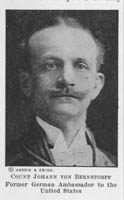 After Phildius arrived in Constantinople on January 21, he visited Graf Johann-Heinrich von Bernstorff, the former German Ambassador to the United States and the new ambassador
to the Ottoman Empire. Von Bernstorff immediately called the German Military Plenipotentiary, General de Lessow, and asked
him to employ his influence with the Turkish Ministry of War. De Lessow arranged an interview for Phildius with Enver Pasha,
provided his personal car for the appointment, and personally introduced him to the Minister of War. Hearing Phildius' proposal
for World's Alliance secretaries to begin WPA work in Turkish prisons, Enver Pasha agreed in principle to accepting Association
services. The Minister of War instructed the State Secretary, Mahmoud Kiamil Pasha, to talk with Phildius to develop a
specific plan. The Turkish secretary scheduled a meeting the next day at the War Office between Phildius and two representatives
of the Ministry of War and two delegates from the Red Crescent Society.28
After Phildius arrived in Constantinople on January 21, he visited Graf Johann-Heinrich von Bernstorff, the former German Ambassador to the United States and the new ambassador
to the Ottoman Empire. Von Bernstorff immediately called the German Military Plenipotentiary, General de Lessow, and asked
him to employ his influence with the Turkish Ministry of War. De Lessow arranged an interview for Phildius with Enver Pasha,
provided his personal car for the appointment, and personally introduced him to the Minister of War. Hearing Phildius' proposal
for World's Alliance secretaries to begin WPA work in Turkish prisons, Enver Pasha agreed in principle to accepting Association
services. The Minister of War instructed the State Secretary, Mahmoud Kiamil Pasha, to talk with Phildius to develop a
specific plan. The Turkish secretary scheduled a meeting the next day at the War Office between Phildius and two representatives
of the Ministry of War and two delegates from the Red Crescent Society.28
29
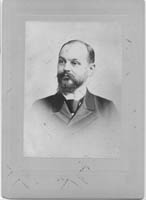 The meeting at the Ministry of War on January 31 included Major Dr. Refik Bey (representing the Sanitary Section of the War
Office), Major Kiemal Bey, (Director of the War Prisoners' Section of the War Office), Dr. Bessim Omer Pasha (Vice President
of the Red Crescent Society), and Izzet Dey (Chief of the War Prisoners' Department of the Red Crescent Society). Phildius
prepared a memorandum in French on the history of the World's Alliance of YMCAs and WPA activities in the Central Power and
Allied nations, and made a specific offer of Association services to the Turkish government. Phildius also included a deadline
for an official reply, February 16, because he planned to leave soon for Geneva via the Balkans. He then discussed the POW
situation in Allied countries with Turkish POWs. During the meeting, Phildius outlined the services WPA secretaries provided
and the privileges they enjoyed. He then offered the services of three neutral secretaries in the Ottoman Empire. The group
discussed Phildius' memo point by point. Refik Bey was especially interested in this document, and promised to do everything
in his power to get an official reply from Enver Pasha as soon as possible.29
The meeting at the Ministry of War on January 31 included Major Dr. Refik Bey (representing the Sanitary Section of the War
Office), Major Kiemal Bey, (Director of the War Prisoners' Section of the War Office), Dr. Bessim Omer Pasha (Vice President
of the Red Crescent Society), and Izzet Dey (Chief of the War Prisoners' Department of the Red Crescent Society). Phildius
prepared a memorandum in French on the history of the World's Alliance of YMCAs and WPA activities in the Central Power and
Allied nations, and made a specific offer of Association services to the Turkish government. Phildius also included a deadline
for an official reply, February 16, because he planned to leave soon for Geneva via the Balkans. He then discussed the POW
situation in Allied countries with Turkish POWs. During the meeting, Phildius outlined the services WPA secretaries provided
and the privileges they enjoyed. He then offered the services of three neutral secretaries in the Ottoman Empire. The group
discussed Phildius' memo point by point. Refik Bey was especially interested in this document, and promised to do everything
in his power to get an official reply from Enver Pasha as soon as possible.29
30
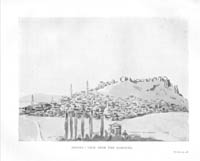 While waiting for an official Turkish response, Phildius developed contacts with the Red Crescent Society and the diplomatic
community in Constantinople. He met with Turkey's allies, the German and Austro-Hungarian ambassadors and the Bulgarian minister.
In addition, Phildius met with the Dutch, Spanish, and Swedish ministers who represented Allied interests in the Ottoman Empire.
Phildius wanted to lay a stronger diplomatic foundation for future negotiations if the Ottoman government failed to respond to
his proposal before his departure date.30
While waiting for an official Turkish response, Phildius developed contacts with the Red Crescent Society and the diplomatic
community in Constantinople. He met with Turkey's allies, the German and Austro-Hungarian ambassadors and the Bulgarian minister.
In addition, Phildius met with the Dutch, Spanish, and Swedish ministers who represented Allied interests in the Ottoman Empire.
Phildius wanted to lay a stronger diplomatic foundation for future negotiations if the Ottoman government failed to respond to
his proposal before his departure date.30
31
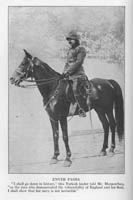 Two weeks after the Ministry of War meeting, Refik Bey telephoned Phildius and told him that he could expect an official
reply the next day. On February 14, Phildius received authorization for YMCA WPA work in the Ottoman Empire from Major Kiemal
Bey, in the name of Enver Pasha. Under this order, the World's Alliance gained a number of privileges, including the appointment
of three neutral secretaries; visitation to all the camps, working detachments (including the Baghdad and other railroad
projects), and hospitals where POWs were located; free transportation of WPA goods; permission to accept requests from prisoners
for transmission to the War Prisoners' Section of the Ministry of War; distribution of money, extra food, clothing, and medicine
to needy POWs; construction of huts in convenient places, equipped with reading and writing rooms, libraries (which included the
Holy Scriptures), and games, plus permission to organize concerts, cinematographic performances, and religious services; and
permission to arrange workshops for the manufacture of small articles by POWs to be sold for their benefit. Major Kiemal Bey
expressly stated that Enver Pasha officially sanctioned this agreement, and that the War Prisoners' Section of the Ministry
of War would extend every necessary assistance to the YMCA in conducting this POW relief.31
Two weeks after the Ministry of War meeting, Refik Bey telephoned Phildius and told him that he could expect an official
reply the next day. On February 14, Phildius received authorization for YMCA WPA work in the Ottoman Empire from Major Kiemal
Bey, in the name of Enver Pasha. Under this order, the World's Alliance gained a number of privileges, including the appointment
of three neutral secretaries; visitation to all the camps, working detachments (including the Baghdad and other railroad
projects), and hospitals where POWs were located; free transportation of WPA goods; permission to accept requests from prisoners
for transmission to the War Prisoners' Section of the Ministry of War; distribution of money, extra food, clothing, and medicine
to needy POWs; construction of huts in convenient places, equipped with reading and writing rooms, libraries (which included the
Holy Scriptures), and games, plus permission to organize concerts, cinematographic performances, and religious services; and
permission to arrange workshops for the manufacture of small articles by POWs to be sold for their benefit. Major Kiemal Bey
expressly stated that Enver Pasha officially sanctioned this agreement, and that the War Prisoners' Section of the Ministry
of War would extend every necessary assistance to the YMCA in conducting this POW relief.31
32
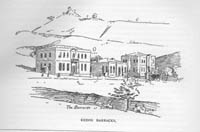 The Turkish Ministry of War extended these privileges on the condition that the World's Alliance obtain official documents
from enemy governments listing the privileges granted to WPA secretaries conducting relief work for Turkish POWs. The degree
of service allowed in the Ottoman Empire for Allied prisoners was directly related to the level of operations undertaken for
Turkish POWs in Allied camps. Phildius did not consider this "condition" too onerous, and as soon as he reached Geneva he
contacted the senior secretaries in the Allied countries to procure official documents.32
The Turkish Ministry of War extended these privileges on the condition that the World's Alliance obtain official documents
from enemy governments listing the privileges granted to WPA secretaries conducting relief work for Turkish POWs. The degree
of service allowed in the Ottoman Empire for Allied prisoners was directly related to the level of operations undertaken for
Turkish POWs in Allied camps. Phildius did not consider this "condition" too onerous, and as soon as he reached Geneva he
contacted the senior secretaries in the Allied countries to procure official documents.32
33
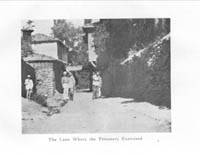 Once the YMCA had fulfilled the official document requirement, the Turkish Ministry of War would appoint a special commission,
including one or two representatives from the War Office and the Red Crescent Society; these representatives would accompany
WPA secretaries during their visits to prison camps. Phildius accepted this requirement as well, since it would allow Association
secretaries to visit prison compounds and labor detachments scattered throughout the Turkish interior, and it would give the
secretaries an "official" status, an important consideration when dealing with prison commandants and minor Ottoman government
officials. In addition, travel for WPA secretaries would be rendered both easier and safer. Turkey was rampant with brigands who
often attacked and robbed travelers. Secretaries traveled by horseback, especially when visiting railroad construction projects,
and any official government presence would increase their chances of arriving safely. Phildius learned from the director of the
Baghdad Railroad that his line alone employed over ten thousand English, Indian, Gurkha, Egyptian, French, Russian, Romanian, and
Serbian POWs. The railroad official welcomed Association aid and promised to help the organization wherever possible. The presence
of these official commission representatives would also help the YMCA win the confidence and appreciation of the Ministry of War.
Phildius concluded that the War Office distrusted everybody, including neutrals. When the members of this commission got to know
the WPA secretaries through daily contact and observed their "correct and loyal conduct" in dealing with Turkish authorities as
well as Allied POWs, the resulting familiarity would greatly aid the Association's POW work in Turkey.33
Once the YMCA had fulfilled the official document requirement, the Turkish Ministry of War would appoint a special commission,
including one or two representatives from the War Office and the Red Crescent Society; these representatives would accompany
WPA secretaries during their visits to prison camps. Phildius accepted this requirement as well, since it would allow Association
secretaries to visit prison compounds and labor detachments scattered throughout the Turkish interior, and it would give the
secretaries an "official" status, an important consideration when dealing with prison commandants and minor Ottoman government
officials. In addition, travel for WPA secretaries would be rendered both easier and safer. Turkey was rampant with brigands who
often attacked and robbed travelers. Secretaries traveled by horseback, especially when visiting railroad construction projects,
and any official government presence would increase their chances of arriving safely. Phildius learned from the director of the
Baghdad Railroad that his line alone employed over ten thousand English, Indian, Gurkha, Egyptian, French, Russian, Romanian, and
Serbian POWs. The railroad official welcomed Association aid and promised to help the organization wherever possible. The presence
of these official commission representatives would also help the YMCA win the confidence and appreciation of the Ministry of War.
Phildius concluded that the War Office distrusted everybody, including neutrals. When the members of this commission got to know
the WPA secretaries through daily contact and observed their "correct and loyal conduct" in dealing with Turkish authorities as
well as Allied POWs, the resulting familiarity would greatly aid the Association's POW work in Turkey.33
34
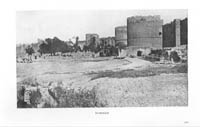 Upon receipt of the War Ministry's reply, Phildius immediately visited Van Bommel in the former Association building in
Constantinople. Phildius' diplomacy represented a major breakthrough. The Turkish government prohibited neutral legations
personnel from visiting prison camps, although they continued to serve as collection depots for food, clothing, and money
distributed to POWs through official Turkish channels. The Dutch legation immediately agreed to entrust WPA secretaries with the
money and supplies it received for distribution among Allied POWs. Phildius had hoped to employ Van Bommel as one of the
three neutral secretaries to be assigned to WPA work in the Ottoman Empire. Van Bommel had considerable experience both
in the country and in POW relief work, and was eager to undertake such service. As a result, Phildius planned to appoint
him as Senior Secretary. Major Kiemal Bey, however, rejected Van Bommel. Although the Turks had nothing personally against
the Dutch national, they did not consider him "perfectly neutral." Van Bommel's long connection with the American YMCA
forced the Ottoman authorities to take this position. The Constantinople Association was considered an American organization,
and had been rumored to be involved in espionage. That the Turkish government had rejected Van Bommel was disappointing, but
he would serve a valuable role as counsel for WPA secretaries after they arrived.34
Upon receipt of the War Ministry's reply, Phildius immediately visited Van Bommel in the former Association building in
Constantinople. Phildius' diplomacy represented a major breakthrough. The Turkish government prohibited neutral legations
personnel from visiting prison camps, although they continued to serve as collection depots for food, clothing, and money
distributed to POWs through official Turkish channels. The Dutch legation immediately agreed to entrust WPA secretaries with the
money and supplies it received for distribution among Allied POWs. Phildius had hoped to employ Van Bommel as one of the
three neutral secretaries to be assigned to WPA work in the Ottoman Empire. Van Bommel had considerable experience both
in the country and in POW relief work, and was eager to undertake such service. As a result, Phildius planned to appoint
him as Senior Secretary. Major Kiemal Bey, however, rejected Van Bommel. Although the Turks had nothing personally against
the Dutch national, they did not consider him "perfectly neutral." Van Bommel's long connection with the American YMCA
forced the Ottoman authorities to take this position. The Constantinople Association was considered an American organization,
and had been rumored to be involved in espionage. That the Turkish government had rejected Van Bommel was disappointing, but
he would serve a valuable role as counsel for WPA secretaries after they arrived.34
35
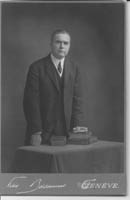 Phildius now called on John R. Mott for the financial support necessary to begin WPA operations in Turkey. The International
Committee had already authorized funding for one secretary and the construction of two Association huts in the Ottoman Empire.
Phildius pointed out that this mission required experienced YMCA secretaries with knowledge of English, French, and German.
Phildius recommended the WPA employ three Swiss secretaries with considerable POW relief experience, and he suggested Edouard
Voellmy, a young Methodist minister already assigned to Austro-Hungarian WPA work, to serve as Senior Secretary. Phildius
planned to get permission from his superior, Bishop Nülsen of Zürich, for the transfer, since Voellmy's congregation in
Bern had expected him back in May 1917. He also recommended Jack Keller, a candidate
Phildius now called on John R. Mott for the financial support necessary to begin WPA operations in Turkey. The International
Committee had already authorized funding for one secretary and the construction of two Association huts in the Ottoman Empire.
Phildius pointed out that this mission required experienced YMCA secretaries with knowledge of English, French, and German.
Phildius recommended the WPA employ three Swiss secretaries with considerable POW relief experience, and he suggested Edouard
Voellmy, a young Methodist minister already assigned to Austro-Hungarian WPA work, to serve as Senior Secretary. Phildius
planned to get permission from his superior, Bishop Nülsen of Zürich, for the transfer, since Voellmy's congregation in
Bern had expected him back in May 1917. He also recommended Jack Keller, a candidate
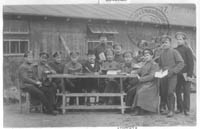 for the Basel Mission for India. Keller had volunteered for WPA service in the Dual Monarchy but the World's Committee assigned him to work in Bulgaria. He spoke Hindustani and would be of considerable service among the ten thousand
Indian POWs incarcerated in Turkey. Phildius' third candidate was Max Rieser, an experienced WPA secretary in Austria-Hungary
who also transferred to serve with the WPA in Bulgaria. He was an intelligent businessman and an active YMCA worker. All three men spoke English,
French, and German, which made them ideal candidates. Phildius also pressed Mott to provide funding for the additional secretaries
because trips into the Anatolian interior would be time-consuming, and a third secretary was necessary to maintain operations
at the WPA headquarters planned for Constantinople.35
for the Basel Mission for India. Keller had volunteered for WPA service in the Dual Monarchy but the World's Committee assigned him to work in Bulgaria. He spoke Hindustani and would be of considerable service among the ten thousand
Indian POWs incarcerated in Turkey. Phildius' third candidate was Max Rieser, an experienced WPA secretary in Austria-Hungary
who also transferred to serve with the WPA in Bulgaria. He was an intelligent businessman and an active YMCA worker. All three men spoke English,
French, and German, which made them ideal candidates. Phildius also pressed Mott to provide funding for the additional secretaries
because trips into the Anatolian interior would be time-consuming, and a third secretary was necessary to maintain operations
at the WPA headquarters planned for Constantinople.35
36
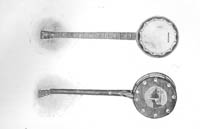 The Turkish authorities provided Phildius with the names of forty-three prison camps
The Turkish authorities provided Phildius with the names of forty-three prison camps
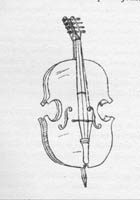 in the empire, along with the number
of POWs incarcerated in each facility.
Phildius believed that at least three of these prison compounds had large enough inmate populations to erect an Association hut.
Smaller prison camps and POWs working in labor detachments could be served by Association tents, where secretaries could set up
reading and writing rooms, social rooms, and simple shelter.36
in the empire, along with the number
of POWs incarcerated in each facility.
Phildius believed that at least three of these prison compounds had large enough inmate populations to erect an Association hut.
Smaller prison camps and POWs working in labor detachments could be served by Association tents, where secretaries could set up
reading and writing rooms, social rooms, and simple shelter.36
37
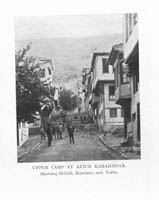 Before Phildius left Constantinople, he began setting up the WPA headquarters. He found a young Greek office worker, of
Turkish nationality, who was a graduate of Robert College and a member of the YMCA. Prior to the war, the young man had
worked for an English insurance company, and he came recommended by Van Bommel. Salaries for workers in the headquarters
would need to be high, in response to the sixteen-fold increase in Turkish prices since November 1914 due to wartime inflation.
Phildius estimated salaries at one hundred Turkish pounds, or 1,700 francs per month.
He had gone over the finances needed for a WPA program in Turkey, and estimated that the Association would need at
least 150,000 francs during 1918. This high estimate reflected the great need of Allied POWs in that country, focusing on clothing, blankets,
medicine, extra food, and buildings for social activities and divine worship. Because over 40 percent of the POWs held in the
Ottoman Empire had died, Phildius was anxious to begin as soon as possible "to bring a ray of light into the hearts and lives
of some of the poorest and most miserable men" without delay.37
Before Phildius left Constantinople, he began setting up the WPA headquarters. He found a young Greek office worker, of
Turkish nationality, who was a graduate of Robert College and a member of the YMCA. Prior to the war, the young man had
worked for an English insurance company, and he came recommended by Van Bommel. Salaries for workers in the headquarters
would need to be high, in response to the sixteen-fold increase in Turkish prices since November 1914 due to wartime inflation.
Phildius estimated salaries at one hundred Turkish pounds, or 1,700 francs per month.
He had gone over the finances needed for a WPA program in Turkey, and estimated that the Association would need at
least 150,000 francs during 1918. This high estimate reflected the great need of Allied POWs in that country, focusing on clothing, blankets,
medicine, extra food, and buildings for social activities and divine worship. Because over 40 percent of the POWs held in the
Ottoman Empire had died, Phildius was anxious to begin as soon as possible "to bring a ray of light into the hearts and lives
of some of the poorest and most miserable men" without delay.37
38
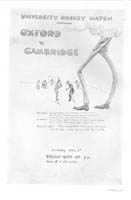 By March 1918, Phildius was back in Geneva preparing for the establishment of WPA work in Turkey. Yet several problems
slowed the introduction of Association secretaries. The British government pressed for a negotiated political settlement
with the Ottomans to improve POW conditions. The British not only had to negotiate with the Ottoman regime for access to
POWs, but with colonial administrations as well. Both the Egyptian and Indian governments held Turkish prisoners, and any
POW agreement had to receive their consent. Controversy erupted between the Indian and Turkish governments in February 1918
when the colonial government stopped issuing bread to Turkish officers in India at government rates. In retaliation, the
Ottomans ended the same privilege for British officers held in Turkish prisons. The bread reprisal stalled talks until the
Indian government relented in September and resumed bread distribution at reduced rates. But Turkish authorities were equally
slow to implement the concluded agreements.
By March 1918, Phildius was back in Geneva preparing for the establishment of WPA work in Turkey. Yet several problems
slowed the introduction of Association secretaries. The British government pressed for a negotiated political settlement
with the Ottomans to improve POW conditions. The British not only had to negotiate with the Ottoman regime for access to
POWs, but with colonial administrations as well. Both the Egyptian and Indian governments held Turkish prisoners, and any
POW agreement had to receive their consent. Controversy erupted between the Indian and Turkish governments in February 1918
when the colonial government stopped issuing bread to Turkish officers in India at government rates. In retaliation, the
Ottomans ended the same privilege for British officers held in Turkish prisons. The bread reprisal stalled talks until the
Indian government relented in September and resumed bread distribution at reduced rates. But Turkish authorities were equally
slow to implement the concluded agreements.
39
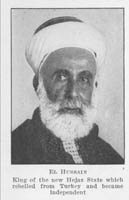 To a large extent, this intransigence was due to the collapse of the Turkish military effort. The Arab Revolt, which began
in June 1916, cut off the Arabian Peninsula from Turkish control when Amir Hussein ibn 'Ali, the Sharif of Mecca, became the newly proclaimed "King of the Arabs" and British ally.
In the fall of 1916, Sir Stanley Maude assumed command of the British forces in Mesopotamia. He resumed the British offensive,
To a large extent, this intransigence was due to the collapse of the Turkish military effort. The Arab Revolt, which began
in June 1916, cut off the Arabian Peninsula from Turkish control when Amir Hussein ibn 'Ali, the Sharif of Mecca, became the newly proclaimed "King of the Arabs" and British ally.
In the fall of 1916, Sir Stanley Maude assumed command of the British forces in Mesopotamia. He resumed the British offensive,
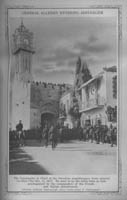 capturing Baghdad in March 1917. The greatest threat to the Turks lay in Palestine.
General Edmund Allenby was dispatched to
Egypt by Prime Minister David Lloyd-George to knock the Ottoman Empire out of the war. Allenby began his offensive in October
1917, and soon breached the Ottoman defenses at Gaza. By December 1917, Allenby had captured Jerusalem. Although some British
forces were transferred from the Egyptian Expeditionary Force to the Western Front in the spring of 1918 to counter the massive
German invasion, Allenby and his Arab allies were poised to strike north into Syria.38
capturing Baghdad in March 1917. The greatest threat to the Turks lay in Palestine.
General Edmund Allenby was dispatched to
Egypt by Prime Minister David Lloyd-George to knock the Ottoman Empire out of the war. Allenby began his offensive in October
1917, and soon breached the Ottoman defenses at Gaza. By December 1917, Allenby had captured Jerusalem. Although some British
forces were transferred from the Egyptian Expeditionary Force to the Western Front in the spring of 1918 to counter the massive
German invasion, Allenby and his Arab allies were poised to strike north into Syria.38
40
After months of negotiations, the British government announced in August 1918 that the British and Turkish governments had
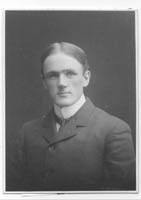 come to terms regarding the treatment of war prisoners. Lieutenant General Herbert Eversley Belfield, the director of POW work and
British officer responsible for negotiations with the Germans, informed Robert L. Ewing, the Senior Secretary for the American
YMCA in England, that the Egyptian and Indian governments would allow Association secretaries to work with Turkish POWs in
those colonies. With this last barrier out of the way, and a reciprocal agreement in place with the Ottoman government,
Belfield gave the English National YMCA Council permission to begin WPA work in the Near East. Ewing immediately contacted
Phildius and Archibald C. Harte, the Senior Secretary for American WPA Work in Europe, and requested that Harte appoint
secretaries for work in Egypt and India.39
come to terms regarding the treatment of war prisoners. Lieutenant General Herbert Eversley Belfield, the director of POW work and
British officer responsible for negotiations with the Germans, informed Robert L. Ewing, the Senior Secretary for the American
YMCA in England, that the Egyptian and Indian governments would allow Association secretaries to work with Turkish POWs in
those colonies. With this last barrier out of the way, and a reciprocal agreement in place with the Ottoman government,
Belfield gave the English National YMCA Council permission to begin WPA work in the Near East. Ewing immediately contacted
Phildius and Archibald C. Harte, the Senior Secretary for American WPA Work in Europe, and requested that Harte appoint
secretaries for work in Egypt and India.39
41
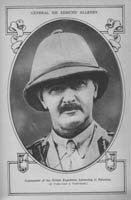 Despite this opening, the YMCA still could not send secretaries into Turkey. Phildius was stymied by the lack of financial
resources and wrote to the International Committee in September 1918 seeking funds. More importantly, the military situation
in the Near East had clearly swung against the Ottoman Empire. During the summer of 1918, the British and the Arabs
conducted a campaign in the Trans-Jordan. In September 1918, Allenby launched a massive offensive and decisively defeated the
Turks and Germans at the Battle of Megiddo. Breaking through the Turko-German lines, the Allies swiftly advanced north and captured
Despite this opening, the YMCA still could not send secretaries into Turkey. Phildius was stymied by the lack of financial
resources and wrote to the International Committee in September 1918 seeking funds. More importantly, the military situation
in the Near East had clearly swung against the Ottoman Empire. During the summer of 1918, the British and the Arabs
conducted a campaign in the Trans-Jordan. In September 1918, Allenby launched a massive offensive and decisively defeated the
Turks and Germans at the Battle of Megiddo. Breaking through the Turko-German lines, the Allies swiftly advanced north and captured
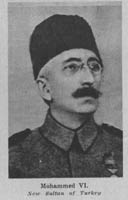 Damascus, Beirut, Homs, and Aleppo during October. From September 19 to October 31, the British captured seventy-five thousand Central Power
prisoners (including 3,700 German and Austro-Hungarian troops), out of a total Ottoman force of 104,000 men. With the British
about to invade southern Anatolia, the Ottoman government decided to end its involvement in the war. The new Sultan, Mohammed
VI (who succeeded his brother to the throne in July) dismissed the Young Turk government and concluded an armistice, which went
into effect on October 31. Less than two weeks later, the Allied fleet passed through the Dardanelles and anchored off
Constantinople, ending the fighting in the Near East.40
Damascus, Beirut, Homs, and Aleppo during October. From September 19 to October 31, the British captured seventy-five thousand Central Power
prisoners (including 3,700 German and Austro-Hungarian troops), out of a total Ottoman force of 104,000 men. With the British
about to invade southern Anatolia, the Ottoman government decided to end its involvement in the war. The new Sultan, Mohammed
VI (who succeeded his brother to the throne in July) dismissed the Young Turk government and concluded an armistice, which went
into effect on October 31. Less than two weeks later, the Allied fleet passed through the Dardanelles and anchored off
Constantinople, ending the fighting in the Near East.40
Conclusion
42
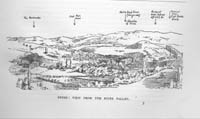 While the American YMCA would respond to Greek and Turkish prisoners' needs from 1922 to 1923, the Association could not mount an
effective relief effort for POWs in the Ottoman Empire during World War I. American Red Triangle assistance was limited to a
collaborative effort with the American and Dutch governments to distribute food and clothing to Allied prisoners in Turkish
prisons and labor detachments. When Phildius received diplomatic approval opening the Ottoman Empire in February 1918 to neutral
secretaries, the World's Alliance was unable to take advantage of the opportunity on the ground. The question arises, Why did
the Association fail in its efforts to set up WPA activities in Turkey?
While the American YMCA would respond to Greek and Turkish prisoners' needs from 1922 to 1923, the Association could not mount an
effective relief effort for POWs in the Ottoman Empire during World War I. American Red Triangle assistance was limited to a
collaborative effort with the American and Dutch governments to distribute food and clothing to Allied prisoners in Turkish
prisons and labor detachments. When Phildius received diplomatic approval opening the Ottoman Empire in February 1918 to neutral
secretaries, the World's Alliance was unable to take advantage of the opportunity on the ground. The question arises, Why did
the Association fail in its efforts to set up WPA activities in Turkey?
43
The most important impediment was the Ottoman regime's suspicion of foreign organizations. As Caliph, the Sultan was the
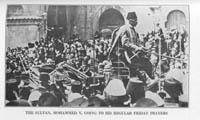 religious leader of the Islamic world, and Protestant social welfare organizations represented a potential threat, through
proselytizing and religious propaganda.
More importantly, the Young Turks were ultra-nationalists, and they noted the strong connections between the American YMCA
and the Greek and Armenian communities in Turkey before the war.
When Jacob approached the Turkish government about the possibility of American secretaries conducting WPA programs for
Allied prisoners, the Young Turks had little choice but to reject the offer. Given the limited resources that the Turks had,
Ottoman authorities had little surplus to devote to maintaining Allied prisoners in their care. As a result, the Turks were
unwilling to permit delegates from neutral governments, let alone representatives of private organizations, to inspect prison
camps.
religious leader of the Islamic world, and Protestant social welfare organizations represented a potential threat, through
proselytizing and religious propaganda.
More importantly, the Young Turks were ultra-nationalists, and they noted the strong connections between the American YMCA
and the Greek and Armenian communities in Turkey before the war.
When Jacob approached the Turkish government about the possibility of American secretaries conducting WPA programs for
Allied prisoners, the Young Turks had little choice but to reject the offer. Given the limited resources that the Turks had,
Ottoman authorities had little surplus to devote to maintaining Allied prisoners in their care. As a result, the Turks were
unwilling to permit delegates from neutral governments, let alone representatives of private organizations, to inspect prison
camps.
44
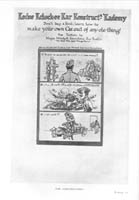 Another important barrier was the political intrigue that surrounded Near Eastern affairs. While both the British and
Turkish governments sought a treaty to improve conditions for their nationals held in POW camps, implementing any agreement
proved near impossible. The British had obstinate colonial administrations in India and Egypt, and had difficulty prodding
them into accepting the POW treaty. Simultaneously, the War Office in London was concerned that food, supplies, and money
sent to Turkey would not actually reach needy Allied prisoners. Military officials feared that these goods might be diverted
Another important barrier was the political intrigue that surrounded Near Eastern affairs. While both the British and
Turkish governments sought a treaty to improve conditions for their nationals held in POW camps, implementing any agreement
proved near impossible. The British had obstinate colonial administrations in India and Egypt, and had difficulty prodding
them into accepting the POW treaty. Simultaneously, the War Office in London was concerned that food, supplies, and money
sent to Turkey would not actually reach needy Allied prisoners. Military officials feared that these goods might be diverted
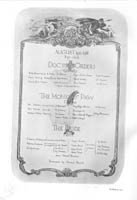 to supply the Turkish Army. More importantly, British military planners embraced the blockade strategy. Supplies shipped to
Turkey for Allied POWs relieved the Ottomans of their responsibility to care for these men. As a result, food and clothing
that should have been distributed to Allied prisoners could instead be issued to Turkish troops. The Turks also participated
in this political intrigue. They conducted a "concede and withdraw" negotiating strategy with the British government and the
World's Alliance. Even though the English and Phildius thought they had finalized agreements, the Turks were reluctant to
implement them. Further talks always seemed to be necessary to iron out details and address new difficulties.
to supply the Turkish Army. More importantly, British military planners embraced the blockade strategy. Supplies shipped to
Turkey for Allied POWs relieved the Ottomans of their responsibility to care for these men. As a result, food and clothing
that should have been distributed to Allied prisoners could instead be issued to Turkish troops. The Turks also participated
in this political intrigue. They conducted a "concede and withdraw" negotiating strategy with the British government and the
World's Alliance. Even though the English and Phildius thought they had finalized agreements, the Turks were reluctant to
implement them. Further talks always seemed to be necessary to iron out details and address new difficulties.
45
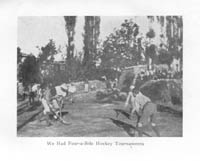 Logistical problems also undermined the Association's WPA operations in Turkey. The only Red Triangle secretaries with
experience in the Near East and who could speak Turkish were affiliated with the American YMCA. By April 1917, these
secretaries were no longer neutral, and could not be deployed in the Ottoman Empire. Only Van Bommel remained in Turkey,
and he was associated with the American YMCA by Ottoman officials.
While Phildius could find Swiss secretaries that spoke English, French, and German,
Logistical problems also undermined the Association's WPA operations in Turkey. The only Red Triangle secretaries with
experience in the Near East and who could speak Turkish were affiliated with the American YMCA. By April 1917, these
secretaries were no longer neutral, and could not be deployed in the Ottoman Empire. Only Van Bommel remained in Turkey,
and he was associated with the American YMCA by Ottoman officials.
While Phildius could find Swiss secretaries that spoke English, French, and German,
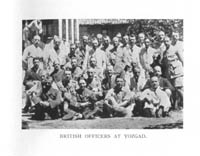 their ability to speak directly with
Turkish officers and minor government authorities in the field would have been severely restricted. The World's Alliance also
faced serious financial barriers to operations in Turkey. The WPA secretaries in the Near East would have had to rely on
the International Committee to provide their salaries and working capital. The costs of Association buildings in Turkish
prisons also would have been borne by the American YMCA.
their ability to speak directly with
Turkish officers and minor government authorities in the field would have been severely restricted. The World's Alliance also
faced serious financial barriers to operations in Turkey. The WPA secretaries in the Near East would have had to rely on
the International Committee to provide their salaries and working capital. The costs of Association buildings in Turkish
prisons also would have been borne by the American YMCA.
46
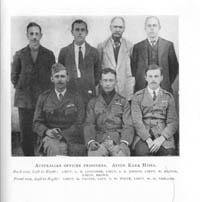 Finally, the military situation in the Near East had a direct bearing on WPA operations. Before April 1916, the Turks held
very few Allied prisoners, and there was little need for the Ottoman regime to welcome Association assistance. As the war
progressed and the Turks accumulated British, Russian, and French POWs, the strain of caring for these prisoners began to
grow.
Concerned for the welfare of Turkish troops in Allied hands, and pressured by international attention to the "Turkish
atrocities" against the Armenians, the Ottomans decided in September 1917 to seek aid from the World's Alliance, but this decision was too little,
too late. By the time the Ministry of War negotiated an agreement with Phildius, the Ottoman Empire's military forces
were crumbling. Ottoman authorities no longer could focus their attention on conditions for POWs, but instead strove to
bolster their armies. Within a few months, Allenby destroyed the Turkish legions in Palestine and Syria, effectively
eliminating the Ottoman Empire from the war.
Finally, the military situation in the Near East had a direct bearing on WPA operations. Before April 1916, the Turks held
very few Allied prisoners, and there was little need for the Ottoman regime to welcome Association assistance. As the war
progressed and the Turks accumulated British, Russian, and French POWs, the strain of caring for these prisoners began to
grow.
Concerned for the welfare of Turkish troops in Allied hands, and pressured by international attention to the "Turkish
atrocities" against the Armenians, the Ottomans decided in September 1917 to seek aid from the World's Alliance, but this decision was too little,
too late. By the time the Ministry of War negotiated an agreement with Phildius, the Ottoman Empire's military forces
were crumbling. Ottoman authorities no longer could focus their attention on conditions for POWs, but instead strove to
bolster their armies. Within a few months, Allenby destroyed the Turkish legions in Palestine and Syria, effectively
eliminating the Ottoman Empire from the war.
47
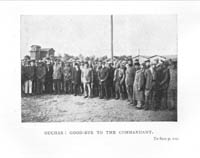 The one bright spot in POW assistance in Turkey was the relief distribution work of Dirk Johannes Van Bommel. Through his
administrative initiative, many Allied POWs survived their captivity during the war. For his efforts, he was decorated by
both the Allied and Turkish governments.
The English government made the secretary an officer in the Order of the British Empire, and the French government awarded
Van Bommel with membership in the Legion of Honor for his relief work. In recognition of his humanitarian efforts for war
prisoners, the Turkish government bestowed the Silver Red Crescent Medal on the Dutch national.41
The one bright spot in POW assistance in Turkey was the relief distribution work of Dirk Johannes Van Bommel. Through his
administrative initiative, many Allied POWs survived their captivity during the war. For his efforts, he was decorated by
both the Allied and Turkish governments.
The English government made the secretary an officer in the Order of the British Empire, and the French government awarded
Van Bommel with membership in the Legion of Honor for his relief work. In recognition of his humanitarian efforts for war
prisoners, the Turkish government bestowed the Silver Red Crescent Medal on the Dutch national.41
Notes:
Note 1: J. Scott Keltie and M. Epstein, eds., The Statesman's Year-Book: Statistical and Historical Annual of the States of the World for the Year 1916. (London: Macmillan and Company, 1916), 1403; and Uncle Sam's Fact Book of the World War Containing A Thousand and One Facts Worth Knowing Concerning the Struggle for Democracy Including Army and Navy Organization, Insignia of Rank, Pay Rolls, Branches of the Service, Regulating Laws, Classification Under and Official Record of Drafts, Etc. (New York: C. S. Hammond and Company, Inc., 1918), 107-8. back
Note 2: The Capitulations were treaties granted by the Ottoman Empire conferring the privilege of extra-territorial jurisdiction within the empire on the subjects of other states. Sultan Suleyman the Magnificient granted the first capitulation to King Francis I of France in 1535 as a counter-balance to the growing power of the Hapsburgs. The French received an exclusive commercial treaty and established rights for Frenchmen living in Turkey, which included individual and religious liberties and the right of French Consuls to judge the civil and criminal affairs of French subjects in the empire. The Ottomans extended similar capitulations to Venice, England, and the Netherlands during the 16th and 17th centuries. The original agreements were limited to the life of the sultan who negotiated the capitulations; in the capitulation of 1740, the agreements became perpetual. During the 18th and 19th centuries, Russia, Belgium, Greece, and the United States also obtained capitulations from the Ottomans. The primary privileges granted to foreigners living in the Ottoman Empire included the liberty of residence, the inviolability of domicile, the right to travel, freedom of commerce and trade, and exclusive extra-territorial jurisdiction over foreigners of the same nationality. When Turkey entered World War I, the Ottoman government suspended the capitulations and the privileges enjoyed by foreigners within the empire. Darius A. Davis, "Annual Report for the Year Ending September 30, 1914," 30 September 1914, 1-2; D. J. Van Bommel, "D. J. Van Bommel, Associate Secretary, Annual Report for the Year Ending September 30, 1915," 30 September 1915, 2. International Division Box: "Turkey: Correspondence, Reports, 1884/1911-1940s." Folder: "Turkey: Annual Reports, 1911-1918." YMCAs of the U.S. Archives, Minneapolis, MN; and D. J. Van Bommel, "D. J. Van Bommel, Secretary, Constantinople, Turkey. Report for Quarter Ending March 31, 1915," 31 March 1915, Constantinople, 2. International Division Box: "Turkey: Correspondence, Reports, 1884/1911-1940s." Folder: "Turkey: Constantinople: Pence, Perry, Van Bommel Report Letters, 1915-1918." Kautz Family YMCA Archives, University of Minnesota Libraries, Minneapolis, MN. back
Note 3: D. J. Van Bommel, "D. J. Van Bommel, Associate Secretary, Annual Report for the Year Ending 30 September 1915," 30 September 1915, 1-6; Ernst O. Jacob, "Report of E.O. Jacob for the Year Ending September 30, 1915," 30 September 1915, 1. International Division Box: "Turkey: Correspondence, Reports, 1884/1911-1940s." Folder: "Turkey: Annual Reports, 1911-1918." YMCAs of the U.S. Archives, Minneapolis, MN. "Review of Y.M.C.A. Work in the Near East," circa 1922, 7. International Division Box 32a: "Turkey: Correspondence and Reports 1964-1977; Istanbul, 1926-1960s; Constantinople, 1913-1925; Angora, 1924-1931; Adana, 1916-1929; Tuzla Camp, 1958, 1959. Section: "Adana." Folder: "Turkey: Adana, 1914-1929." Kautz Family YMCA Archives, University of Minnesota Libraries, Minneapolis, MN. D. J. Van Bommel, "D. J. Van Bommel, Secretary, Constantinople, Turkey. Report for Quarter Ending March 31, 1915," 31 March 1915, Constantinople, 1. International Division Box: "Turkey: Correspondence, Reports, 1884/1911-1940s." Folder: "Turkey: Constantinople: Pence, Perry, Van Bommel Report Letters, 1915-1918." Kautz Family YMCA Archives, University of Minnesota Libraries, Minneapolis, MN. D. J. Van Bommel to A. G. Studer, "Report for Quarter Ending December 31st, 1914," December 31, 1914, Constantinople, 1-2. International Division Box 265: "Turkey: Correspondence and Reports, 1904-1948; Near East Survey, 1927." Folder: "Turkey: 1914." YMCAs of the U.S. Archives, Minneapolis, MN; and "Report on the Third Regular Meeting of the Executive Council, February 10, 1915," February 10, 1915, 1. International Division Box 265: "Turkey: Correspondence and Reports, 1904-1948; Near East Survey, 1927." Folder: "Turkey: 1915-1917." Kautz Family YMCA Archives, University of Minnesota Libraries, Minneapolis, MN. back
Note 4: E. O. Jacob, "Report of E. O. Jacob for the Year Ending September 30, 1915," 30 September 1915, 2-5; Ernst O. Jacob, "Annual Report of E. O. Jacob, For the Year Ending September 30, 1916," 30 September 1916, 3-4. International Division Box: "Turkey: Correspondence, Reports, 1884/1911-1940s." Folder: "Turkey: Annual Reports, 1911-1918." Kautz Family YMCA Archives, University of Minnesota Libraries, Minneapolis, MN; and Owen E. Pence, "O. E. Pence, Student Secretary, Robert College, Young Men's Christian Association, Constantinople, Turkey. Report for Quarter Ending December 31, 1915," December 1915, Constantinople, 1-5. International Division Box: "Turkey: Correspondence, Reports, 1884/1911-1940s." Folder: "Turkey: Constantinople: Pence, Perry, Van Bommel Report Letters, 1915-1918." Kautz Family YMCA Archives, University of Minnesota Libraries, Minneapolis, MN; and Owen E. Pence, "Report for the Quarter Ending 30 June 1915; O. E. Pence. Secretary of the Young Men's Christian Association, Robert College-Constantinople," 30 June 1915 1-4; Owen E. Pence to John R. Mott, 17 June 1915, 1-3; E. O. Jacob to John R. Mott, 9 September 1915, Constantinople, 1-2. International Division Box 265: "Turkey: Correspondence and Reports, 1904-1948; Near East Survey, 1927." Folder: "Turkey: 1915-1917." Kautz Family YMCA Archives, University of Minnesota Libraries, Minneapolis, MN. back
Note 5: "Turkey: A Letter from Our Secretary in Constantinople, January 26, 1915," For the Millions of Men Now Under Arms 1 (1 March 1915): 29-30. back
Note 6: "Turkey: From Our Secretary in Constantinople, June 8, 1915," For the Millions of Men Now Under Arms 2 (15 September 1915): 56-57; Ernst O. Jacob, "E. O. Jacob, Traveling Secretary, Constantinople, Turkey. Report for the Quarter Ending June 30, 1915," 30 June 1915, Constantinople, 1; Owen E. Pence, "O. E. Pence, Secretary Robert College, Constantinople, Report for Quarter Ending June 30, 1915," 30 June 1915, Constantinople, 2. International Division Box: "Turkey: Correspondence, Reports, 1884/1911-1940s." Folder: "Turkey: E. O. Jacob's Report Letters, 1911-1916." Kautz Family YMCA Archives, University of Minnesota Libraries, Minneapolis, MN. D. J. Van Bommel, "D. J. Van Bommel, Associate Secretary, Annual Report for the Year Ending 30 September 1915," 30 September 1915, 3. International Division Box: "Turkey: Correspondence, Reports, 1884/1911-1940s." Folder: "Turkey: Annual Reports, 1911-1918." Kautz Family YMCA Archives, University of Minnesota Libraries, Minneapolis, MN. Ernst O. Jacob, "E. O. Jacob, Traveling Secretary for Turkey, Report Dated January 15, 1916, Received June 23, 1916," 15 January 1916, 1-2. International Division Box: "Turkey: Correspondence, Reports, 1884/1911-1940s." Folder: "Turkey: E. O. Jacob's Report Letters, 1911-1916." Kautz Family YMCA Archives, University of Minnesota Libraries, Minneapolis, MN. "Summary of Minutes of Regular Monthly Meetings of the International Committee of the Young en's Christian Associations," 14 October 1915, New York, 4. International Committee, Monthly Meeting Minutes, 1909-1916. Kautz Family YMCA Archives, University of Minnesota Libraries, Minneapolis, MN. back
Note 7: Ernst O. Jacob, "Annual Report of E. O. Jacob, For the Year Ending September 30, 1916," 30 September 1916, 5-6. International Division Box: "Turkey: Correspondence, Reports, 1884/1911-1940s." Folder: "Turkey: Annual Reports, 1911-1918." Kautz Family YMCA Archives, University of Minnesota Libraries, Minneapolis, MN. back
Note 8: Ibid., 2-7; Owen E. Pence, "Annual Report (as of August 31, 1916)," 31 August 1916, 1-3; D. J. Van Bommel, "D. J. Van Bommel, Annual Report for the Year Ending 30 September 1916," 30 September 1916, 2-3. International Division Box: "Turkey: Correspondence, Reports, 1884/1911-1940s." Folder: "Turkey: Annual Reports, 1911-1918." Kautz Family YMCA Archives, University of Minnesota Libraries, Minneapolis, MN. Ernst O. Jacob, "E. O. Jacob, Traveling Secretary for Turkey, Report Dated January 15, 1916, Received June 23, 1916," 15 January 1916, 1. International Division Box: "Turkey: Correspondence, Reports, 1884/1911-1940s." Folder: "Turkey: E. O. Jacob's Report Letters, 1911-1916." Kautz Family YMCA Archives, University of Minnesota Libraries, Minneapolis, MN. Owen E. Pence to John R. Mott, 17 January 1916, Constantinople, 1; Ernst O. Jacob to Edward C. Jenkins, 1 March 1916, Constantinople, 1; M. Bowen, "Report of the President of the Board," circa March 1916, 1-6; D. J. Van Bommel to John R. Mott, 20 March 1916, 1-2; Owen E. Pence to John R. Mott, 3 April 1916, Constantinople, 1-2; Ernst O. Jacob to John R. Mott, 22 May 1916, 1-3; John R. Mott to Edward C. Jenkins, 24 May 1916, 1; Ernst O. Jacob to Edward C. Jenkins, 25 May 1916, Chicago, 1-2. D. J. Van Bommel to John R. Mott, 12 June 1916, Constantinople, 1. International Division Box 265: "Turkey: Correspondence and Reports, 1904-1948; Near East Survey, 1927." Folder: "Turkey: 1915-1917." YMCAs of the U.S. Archives, Minneapolis, MN. "Summary of Minutes of Regular Monthly Meetings of the International Committee of the Young Men's Christian Associations," 14 October 1915, New York, 4. International Committee, Monthly Meeting Minutes, 1909-1916. Kautz Family YMCA Archives, University of Minnesota Libraries, Minneapolis, MN. back
Note 9: D. J. Van Bommel, "D. J. Van Bommel, Annual Report for the Year Ending 30 September 1916," 4; Ernst O. Jacob, "Annual Report of E. O. Jacob, For the Year Ending September 30th, 1916," 30 September 1916, 1-2. International Division Box: "Turkey: Correspondence, Reports, 1884/1911-1940s." Folder: "Turkey: Annual Reports, 1911-1918." Kautz Family YMCA Archives, University of Minnesota Libraries, Minneapolis, MN. "Review of Y.M.C.A. Work in the Near East," circa 1922, 7. International Division Box: "Turkey: Correspondence, Reports, 1884/1911-1940s." Folder: "Turkey: Review of YMCA Work and Annual Report (Near East), 1921." Kautz Family YMCA Archives, University of Minnesota Libraries, Minneapolis, MN. back
Note 10: "Constantinople Building Minutes of June 7, 1916," 7 June 1916, 1; G. Bie Ravndal to John R. Mott, 16 December 1916, Constantinople, 1. International Division Box 32a: "Turkey: Correspondence and Reports 1964-1977; Istanbul, 1926-1960s; Constantinople, 1913-1925; Angora, 1924-1931; Adana, 1916-1929; Tuzla Camp, 1958, 1959. Folder: "Turkey: Constantinople, 1913-1919." YMCAs of the U.S. Archives, Minneapolis, MN. Edward C. Jenkins to Ernst O. Jacob, 16 June 1916, 1. Edward C. Jenkins to G. H. Huntington, 14 August 1916, 1-2. International Division Box 265: "Turkey: Correspondence and Reports, 1904-1948; Near East Survey, 1927." Folder: "Turkey: 1915-1917." YMCAs of the U.S. Archives, Minneapolis, MN. back
Note 11: Edward C. Jenkins to Ernst O. Jacob, 16 June 1916, 1; Edward C. Jenkins to G. H. Huntington, 14 August 1916, 1. International Division Box 265: "Turkey: Correspondence and Reports, 1904-1948; Near East Survey, 1927." Folder: "Turkey: 1915-1917." Kautz Family YMCA Archives, University of Minnesota Libraries, Minneapolis, MN. G. Bie Ravndal to John R. Mott, 16 December 1916, Constantinople, 1-2; D. J. Van Bommel, "Report of D. J. Van Bommel," circa 1916, 1. International Division Box 32a: "Turkey: Correspondence and Reports 1964-1977; Istanbul, 1926-1960s; Constantinople, 1913-1925; Angora, 1924-1931; Adana, 1916-1929; Tuzla Camp, 1958, 1959. Folder: "Turkey: Constantinople, 1913-1919." Kautz Family YMCA Archives, University of Minnesota Libraries, Minneapolis, MN. "Review of the Y.M.C.A. Work in the Near East," circa 1922, 7. International Division Box: "Turkey: Correspondence, Reports, 1884/1911-1940s." Folder: "Turkey: Review of YMCA Work and Annual Report (Near East), 1921." Kautz Family YMCA Archives, University of Minnesota Libraries, Minneapolis, MN. back
Note 12: Michael Moynihan, ed., Black Bread and Barbed Wire: Prisoners in the First World War (London: Leo Cooper, 1978), 159; and Samuel Lyman Atwood Marshall, The American Heritage History of World War I (New York: American Heritage Publishing Company, 1982), 72, 110-19, and 184. back
Note 13: Moynihan, Black Bread and Barbed Wire, 159-60. back
Note 14: "Turkish Cruelty to Prisoners: Fatal Sufferings of Britons Who Fell into Ottoman Hands at Kut-el-Amara," Current History Magazine 9:2 (January 1919): 89-90; "A Prisoner in Turkey," Living Age 300 (22 February 1919): 456-60; and Alan Bott, "Eastern Nights—and Flights: I. Damascus and the Flight that Failed," Harper's Monthly Magazine 139 (August 1919): 348. back
Note 15: Ernst O. Jacob to John R. Mott, 20 May 1916, 1. International Division Box 265: "Turkey: Correspondence and Reports, 1904-1948; Near East Survey, 1927." Folder: "Turkey: 1915-1917." Kautz Family YMCA Archives, University of Minnesota Libraries, Minneapolis, MN. back
Note 16: Jacob to Mott, 20 May 1916, 1-2. back
Note 17: Jacob to Mott, 20 May 1916, 2; Edward C. Jenkins to Ernst O. Jacob, 16 June 1916, 1. International Division Box 265: "Turkey: Correspondence and Reports, 1904-1948; Near East Survey, 1927." Folder: "Turkey: 1915-1917." Kautz Family YMCA Archives, University of Minnesota Libraries, Minneapolis, MN. "Turkish Cruelty to Prisoners," 89-90; Alan Bott, "Eastern Nights—and Flights: II. Turkish Trains and British Tommies," Harper's Monthly Magazine 139 (September 1919): 569; and Uncle Sam's Fact Book, 113. back
Note 18: Von Spiegelfeld, "Central Powers," For the Millions of Men Now Under Arms 2 (1 February 1917): 39-40; and Ambassador Frederic Penfield to Ambassador Adam J. Elkus [sic], 2 November 1916, Vienna, 1. World's Alliance Box X391: "War Work Y.M.C.A., 1914-1918: World's Committee, Geneva." Folder: "War Work of World's Committee—Reports of Christian Phildius." World's Alliance of YMCAs Archives, Geneva. back
Note 19: D. J. Van Bommel, "Report from D. J. Van Bommel," circa 1916, 1-2. International Division Box: "Turkey: Correspondence, Reports, 1884/1911-1940s." Folder: "Turkey: Annual Reports, 1911-1918." Kautz Family YMCA Archives, University of Minnesota Libraries, Minneapolis, MN; and D. J. Van Bommel, "Turkey," For the Millions of Men Now Under Arms 2 (1 June 1917): 51. back
Note 20: The Spanish legation took over the interests of Italy and Romania, while the Swedish legation represented the United States and Greece. D. J. Van Bommel to John R. Mott, 24 April 1917, Constantinople, 1; D. J. Van Bommel to Edward C. Jenkins, 24 August 1917, Constantinople, 1. International Division Box 265: "Turkey: Correspondence and Reports, 1904-1948; Near East Survey, 1927." Folder: "Turkey: 1915-1917." Kautz Family YMCA Archives, University of Minnesota Libraries, Minneapolis, MN. "Review of Y.M.C.A. Work in the Near East," circa 1922, 7. International Division Box: "Turkey: Correspondence, Reports, 1884/1911-1940s." Folder: "Turkey: Review of YMCA Work and Annual Report (Near East), 1921." Kautz Family YMCA Archives, University of Minnesota Libraries, Minneapolis, MN. Christian Phildius to John R. Mott, 18 February 1918, Sofia, 4. World Alliance Box X392.2: "War Prisoners' Aid Y.M.C.A., 1914-1918: Russian P.O.W.s in Germany, 1920-1921; War Prisoners' Aid in Turkey, Great Britain, Italy." Folder: "War Prisoners' Aid, Y.M.C.A. in Turkey." World Alliance of YMCAs Archives, Geneva. back
Note 21: D. J. Van Bommel to Edward C. Jenkins, 24 August 1917, Constantinople, 1; D. J. Van Bommel to Edward C. Jenkins, 22 September 1917, Constantinople, 1. International Division Box 265: "Turkey: Correspondence and Reports, 1904-1948; Near East Survey, 1927." Folder: "Turkey: 1915-1917." YMCAs of the U.S. Archives, Minneapolis, MN. "Review of Y.M.C.A. Work in the Near East," circa 1922, 7. International Division Box: "Turkey: Correspondence, Reports, 1884/1911-1940s." Folder: "Turkey: Review of YMCA Work and Annual Report (Near East), 1921." Kautz Family YMCA Archives, University of Minnesota Libraries, Minneapolis, MN. "Biographical Summary of D. J. Van Bommel," 1 October 1929, 1. Kautz Family YMCA Archives, Biographical Files-C Box 12: "Tib-Vol." Folder: "Biographical Date: Van Bommel, Dirk Johannes." Kautz Family YMCA Archives, University of Minnesota Libraries, Minneapolis, MN. Alan Bott, "Eastern Nights—and Flights: II. Turkish Trains and British Tommies," 569. back
Note 22: "The British Prisoners in Turkey," The Spectator, 121 (7 September 1918): 245-46. back
Note 23: Great Britain, Treaties, etc., 1910-1936, Agreement between the British and Ottoman Governments-Respecting Prisoners of War and Civilians, cd. 9024 (London: Stationery Office, April 1918), 1-5; and "The British Prisoners in Turkey," 246. back
Note 24: Great Britain, Treaties, etc., 1910-1936, Agreement between the British and Ottoman Governments-Respecting Prisoners of War and Civilians, 6-11. back
Note 25: "The British Prisoners in Turkey," 246. back
Note 26: "The British Prisoners in Turkey," 246. back
Note 27: Christian Phildius to John R. Mott, 18 February 1918, Sofia, 1. World Alliance Box X392.2: "War Prisoners' Aid Y.M.C.A., 1914-1918: Russian P.O.W.s in Germany, 1920-1921; War Prisoners' Aid in Turkey, Great Britain, Italy." Folder: "War Prisoners' Aid, Y.M.C.A. in Turkey." World Alliance of YMCAs Archives, Geneva. D. J. Van Bommel to John R. Mott, 9 March 1918, Constantinople, 1-2. International Division Box 265: "Turkey: Correspondence and Reports, 1904-1948; Near East Survey, 1927." Folder: "Turkey: 1918-1919." Kautz Family YMCA Archives, University of Minnesota Libraries, Minneapolis, MN. Christian Phildius, "Rapport de M. Phildius sur son dernier voyage en Allemagne et en Scandinavie," 15 September 1917, Geneva, 1-6. World's Alliance Box X391: "War Work Y.M.C.A., 1914-1918: World's Committee, Geneva." Folder: "War Work of World's Committee—Reports of Christian Phildius." World's Alliance of YMCAs Archives, Geneva. back
Note 28: Enver Pasha spoke German (he had served as the Turkish military attaché in Berlin) and the negotiations were conducted without an interpreter. Christian Phildius to John R. Mott, 18 February 1918, Sofia, 1-2. World Alliance Box X392.2: "War Prisoners' Aid Y.M.C.A., 1914-1918: Russian P.O.W.s in Germany, 1920-1921; War Prisoners' Aid in Turkey, Great Britain, Italy." Folder: "War Prisoners' Aid, Y.M.C.A. in Turkey." World's Alliance of YMCAs Archives, Geneva. back
Note 29: Phildius to Mott, 18 February 1918, 2. back
Note 30: Phildius to Mott, 18 February 1918, 3-4. back
Note 31: Phildius to Mott, 18 February 1918, 2-3. Major Kiemal Bey to Christian Phildius, 14 February 1918, Constantinople, 1-2. World Alliance Box X392.2: "War Prisoners' Aid Y.M.C.A., 1914-1918: Russian P.O.W.s in Germany, 1920-1921; War Prisoners' Aid in Turkey, Great Britain, Italy." Folder: "War Prisoners' Aid, Y.M.C.A. in Turkey." World Alliance of YMCAs Archives, Geneva. back
Note 32: Phildius to Mott, 18 February 1918, 3. back
Note 33: Phildius to Mott, 18 February 1918, 3. back
Note 34: Phildius to Mott, 18 February 1918, 4. back
Note 35: Phildius to Mott, 18 February 1918, 4-5. back
Note 36: Phildius to Mott, 18 February 1918, 5. back
Note 37: Phildius to Mott, 18 February 1918, 5. back
Note 38: Christian Phildius to Paul Des Gouttes, 21 March 1918, Geneva, 1-7. World's Alliance Box X391: "War Work Y.M.C.A., 1914-1918: World's Committee, Geneva." Folder: "War Work of World's Committee—Reports of Christian Phildius." World's Alliance of YMCAs Archives, Geneva. "The British Prisoners in Turkey," 246; and David L. Bullock, Allenby's War: The Palestine-Arabian Campaigns, 1916-1918 (London: Blandford Press, 1988), 61-98. back
Note 39: No. 947, Minute No. 939: "Work for Prisoners in Turkey," 13 August 1918. Armed Services Records Box AS-19: "National Council Y.M.C.A. [England] Prisoners' War Department Minutes, 1915-1918." Kautz Family YMCA Archives, University of Minnesota Libraries, Minneapolis, MN. back
Note 40: Christian Phildius to John R. Mott, 10 September 1918, Geneva, 1-2. World's Alliance Box X392.2: "War Prisoners' Aid Y.M.C.A., 1914-1918: Russian P.O.W.s in Germany, 1920-1921; War Prisoners' Aid in Turkey, Great Britain, Italy." Folder: "War Prisoners' Aid, Y.M.C.A. in Turkey." World's Alliance of YMCAs, Geneva. "A Prisoner in Turkey," Living Age, 300 (22 February 1919): 460; and Bullock, Allenby's War, 127-51. back
Note 41: "Biographical Summary of D. J. Van Bommel," 1 October 1929, 1. Kautz Family YMCA Archives, Archives Biographical Files-C Box 12: "Tib-Vol." Folder: "Biographical Data: Van Bommel, Dirk Johannes." Kautz Family YMCA Archives, University of Minnesota Libraries, Minneapolis, MN. back
